Entry Requirements for American Travelers to France
Inspiration

Reading time: 0 min Published on 4 January 2023, updated on 16 April 2024

PASSPORTS AND VISAS
All U.S. and Canadian citizens, including infants, need a valid passport to enter France. Visas are not required for American and Canadian visitors staying in France for up to 90 days. For more information, contact your nearest French Consulate. See a list of local French consulates in the U.S.
It is mandatory in France to carry some form of identification at all times. If you lose your passport, the nearest U.S. Consulate will issue Americans a limited-validity replacement if travel is imminent, or a full-validity passport if further travel is not within two weeks. When in France, please carry a photocopy of your passport separately from your passport. The copy will facilitate issuance of a replacement ($75 fee for adults, $85 for children). The American Embassy in Paris is at 2, avenue Gabriel, tel. 01 43 12 22 22. The Passport Section is nearby at 4, avenue Gabriel (open 9a.m.-noon, Monday- Friday). There are other Consular Offices in Bordeaux, Lille, Lyon, Marseille, Nice, Rennes, Strasbourg and Toulouse that provide assistance to American citizens.
Entering France : Travelers from countries outside the European Union (EU) must declare certain articles when entering France. Duty and import taxes are levied on items not for personal use that individually or collectively exceed 175€ in value. Certain categories of items for personal use (tobacco products, alcoholic beverages, perfumes, coffee and tea, etc.) may be brought in untaxed up to certain authorized amounts. The following are forbidden or subject to strict control: drugs, radioactive materials, firearms, endangered species, plants, ivory and food, meat and dairy products. Carry prescriptions to authenticate any controlled substances. “Monetary instruments” equal to more than 10,000€ (whether brought into or taken out of France) must be declared. When in doubt, consult the French Embassy , a French Consulate or the French Customs and Excise Service's “ Info Douanes Service ” in Paris at tel. 08 20 02 44 44 (8:30 a.m.-6:00 p.m., Monday to Friday)
Re-entering the U.S. : Returning U.S. citizens who have been away for 48 hours or more are allowed to bring back, once every 30 days, $800 worth of merchandise duty-free. You're charged a flat rate of duty on the next $1,000 worth of purchases, and any dollar amount beyond that is subject to duty at whatever rates apply. On mailed gifts, the duty-free limit is $200. Have your receipts or purchases handy to expedite the declaration process. Note: If you owe duty, you are required to pay upon your arrival in the United States, using cash, personal check, government or traveler's check, or money order; some locations also accept Visa or MasterCard.
BRINGING YOUR PETS TO FRANCE
Travelers may bring dogs, cats and ferrets into France. Each family is limited to five animals, which must have valid rabies vaccination certificates and be identifiable by a microchip or tattoo. For more information, including details about travel with pet rodents, reptiles, birds or other species, visit www.ambafrance-us.org or contact the French Embassy.
- TWITTER - Follow the Embassy on Twitter

By France.fr
The magazine of the destination unravels an unexpected France that revisits tradition and cultivates creativity. A France far beyond what you can imagine…
Holidays at Galeries Lafayette

Air France, the best and most comfortable way to get to France

French Wine Tasting with Duclot La Cave

Gift vouchers for your shopping at Galeries Lafayette

The Christmas Windows Display and Characters

A Fairy Tale 1, 2, 3 Christmas!

8 Luxurious Boutiques in Paris

A historical and cultural melting pot in French Polynesia
Tahiti-French Polynesia

We’re sorry, this site is currently experiencing technical difficulties. Please try again in a few moments. Exception: request blocked

France Has Reopened to U.S. Travelers—Here’s Everything You Need to Know About Visiting
A reporter based in france breaks down the situation on the ground and what travelers who want to go should know..
- Copy Link copied

Paris has emerged from lockdown, and “finally, the city’s light has been reignited,” our correspondent writes.
Photo by Shutterstock
On June 9, after more than a year of being fermé to foreign travelers and residents being locked down in various forms (permission slips needed to leave the house and nighttime curfews have been among the many restrictions that have come and gone), France began welcoming vaccinated tourists to the land of buttery croissants and stinky cheese. On June 18, the country opened to all Americans , whether they are vaccinated or not. Here’s the scoop on how to experience la belle vie once again and what to know if you plan to travel to France in the near future.
Is France open to U.S. tourists?
Yes, U.S. citizens can currently travel to France. On June 18, the same day that the European Council added the United States to its list of countries approved for entry , France moved the United States to its “ green list ” of countries. This means all U.S. travelers can enter, regardless of vaccination status (though the requirements are slightly different for those who are vaccinated versus for those who are not).
Travel restrictions and requirements for travel to France
If you are . . .
Traveling to France from the U.S.
Since the U.S. is on the green list, vaccinated leisure travelers from the U.S. can enter France with no additional public health requirements (such as COVID testing) or quarantine. Unvaccinated leisure travelers from the U.S. can enter France as long as they present a negative PCR or antigen COVID test from within 72 hours prior to their flight.
Unvaccinated children traveling from the U.S. are allowed to enter France, but those age 11 and older will have to show a negative test.
Additional countries on the green list as of press time are Albania, Australia, Bosnia, Brunei, Canada, Hong Kong, Israel, Japan, Kosovo, Lebanon, Montenegro, New Zealand, North Macedonia, Saudi Arabia, Serbia, Singapore, South Korea, Taiwan, and Vanuatu.
Traveling to France from other international destinations
Those coming from France’s “orange list” of countries, must be vaccinated to enter for leisure travel, and they must be carrying with them a negative COVID-19 PCR or antigen test. Unvaccinated travelers from orange list countries may only enter for essential reasons, must have a negative PCR or antigen test from within 72 hours of boarding (48 hours for the antigen test), could be subject to a random test upon arrival, and are asked to quarantine for seven days.
The “red list” includes countries wrestling with virus surges and worrisome variants, including Brazil, India, Russia and South Africa. Even vaccinated travelers from red countries will still need to justify the trip, must submit to testing before and after their flight, and quarantine for a week.
How to travel to France in 2021
Whether you’re daydreaming of Paris or Lyon, Marseilles or Bourdeaux, there are a few extra steps to take and things to know before you travel to France from the U.S. right now.
As of July 21, visitors need a special COVID pass to ride up the Eiffel Tower or visit French museums or movie theaters, as part of a government effort to curb the rise in delta variant infections. To get the COVID pass, people must show they are either fully vaccinated, have a negative virus test or proof they recently recovered from an infection.
At the Eiffel Tower, workers are scanning QR codes on digital health passes or checking printed vaccine or COVID test certificates.
Several airlines are flying to France from the U.S., and fares are low
Airlines that are operating flights to France include Delta, Air France, American, Lufthansa, Finn Air, Iberia, United, Swiss, and TAP Portugal. What’s more, the rates are pretty good, starting at about $550 round-trip for both nonstop and connecting flights to Paris.
Consider booking one of several new hotels that recently opened in France

Visit France’s renowned châteaux region while relaxing in nature at the new Loire Valley Lodges.
Courtesy of Loire Valley Lodges
The pandemic didn’t prevent several new hotels from opening up in Paris and elsewhere in France. In the capital, film fans and anyone who’s missed the cinema might want to check into Hotel Paradiso . Each room is outfitted with its own projection screen with hundreds of movies to watch from the privacy of your bed—Twizzlers included. Over near the market street Rue Montorgueil and the popular food-driven block Rue du Nil in the Second arrondissement, the Hotel du Sentier is a lovely choice for a sunlit, contemporary styled stay behind an old Egyptian facade. For those seeking a wellness-focused property, Hoy Paris recently opened on the trendy Ninth arrondissement street Rue des Martyrs. TVs are swapped for ballet bars in some of the 22 rooms, and guests have access to yoga mats as well as carafes of water purified with Japanese binchotan charcoal.
In the rest of the country, Loire Valley Lodges , which opened last July, is an excellent place to remain socially distant in a chic tree house not far from the region’s famed châteaux. The hottest address in Marseille is Tuba Club , with only five cabanas to spare for overnight stays, but the coolest rocks to sunbathe on in the south. Speaking of rocks, Hotel les Roches Rouges remains the place French Riviera dreams are made of, while the soon-to-open Souki Lodges and Spa at the foot of Pic de Vissou mountain in Provence’s wine region offers ecofriendly vibes amidst nature. Further to the west, and closer to the coast just north of Biarritz, the 33-room stunner 70 Hectares and the Ocean from the family behind luxury Provence property Domaine de Fontenille opens in June.
Requirements for returning to the United States from France
All international arrivals to the United States —including returning U.S. citizens—must provide proof of a laboratory-generated negative COVID-19 test result procured no more than three days prior to departure to the U.S. The test must be either a viral antigen test or a nucleic acid amplification test (NAAT), such as a polymerase chain (PCR) test. There is currently no exception for those who have been vaccinated for COVID-19.
Where travelers can get a COVID test in France
Getting a test is pretty easy all over Paris and appointments aren’t usually required, depending on the site, though you can make one using the Doctolib app . Tests are free regardless of your nationality or whether you have insurance, and results often take less than 24 hours—but be sure that results are guaranteed within the required time frame.
What it’s like to travel to France right now
France is finally vibrant again. Electric, joyous, drunk even. Parisians have been cooped up for far too long and are spilling out onto the makeshift terraces that restaurants and bars built on the street and sidewalks to accommodate the previous outdoor-only restrictions.
Paris’ light has been reignited. The nightly 9 p.m. curfew recently shifted to 11 p.m. (from 7 p.m. before that), allowing Parisians to enjoy the long days—when the sun doesn’t set until well after 10 p.m.—without having to put a cork in a bottle of wine they ordered at dinner to drink the rest at home.

Parisians are spilling out into the streets now that lockdown measures have been lifted.
Speaking of dining, restaurants and bars are not only allowed to serve outdoors again with up to six people per table but inside as well at a limited capacity. Cultural institutions, such as the Louvre and other museums, have reopened with a capacity of up to 800 people indoors and 1,000 outdoors. Come June 30, there will be no restrictions on the number of people gathering indoors, but nightclubs will remain closed. All of this remains subject to change at any moment if “the incidence rate again exceeds 400 infections per 100,000 inhabitants; a sudden increase in this rate; or a threat of saturation of intensive care services,” Macron cautioned back in April. In France, masks are still required in all public places, even for those who are vaccinated (except when running or cycling), and gatherings of more than six people are forbidden. Alcohol consumption in public remains banned (prior to the pandemic there was no such ban).
Nevertheless, those who work in the tourism and restaurant industries remain optimistic and ready to welcome visitors with open arms. “Are we ready?” says David Mebane, founder and CEO of the Austin-based Fat Tire Tours , a bicycle tour company with hubs in eight foreign cities, including Paris. “Desperately ready. We’ve been ready. Champing at the bit. I don’t know what other idioms I can come up with. We are so looking forward to getting back to what we do best: having fun and showing people around the European cities we love.”
June Chin-Ramsey, CEO of private and small group tour provider Context , is equally enthusiastic about welcoming travelers to France again and at the moment is only offering private tours: “We understand that as our world emerges from a year in lockdown, there will be varying levels of comfort when it comes to getting back on a plane or setting foot in a different country,” says Chin-Ramsey. “It’s important to us that we find ways to meet each of our customers where they are at.”
Few people are truly abiding by the social distancing rules (which is three feet in France, versus the six feet recommended by U.S. public health officials). While masks are still required everywhere—even outside—they’re often worn haphazardly (such as below the nose or dangling from an ear). Cops do occasionally stroll certain areas known for group congregating (like by the Seine, Canal Saint-Martin, etcetera) but don’t seem to be giving tickets, more so just some side-eye and a tsk-tsk.
People are definitely feeling hopeful for a more “normal” summer ahead as the vaccine rollout has finally ramped up and is now being offered to younger age ranges. In fact, the wait time between doses is longer here (six weeks versus three in the U.S.) to ensure more people get at least one dose. Each day, I hear from yet another friend who has gotten their first dose of a COVID-19 vaccine, which is making things feel increasingly positive. One French friend says she’s in full-on “ revenge travel ” mode and has already booked trips to Portugal , Croatia, Greece, and Italy for summer.
This story originally appeared on May 6, 2021, and was updated on July 21, 2021, to include current information. Associated Press contributed reporting.
>> Next: 6 Overlooked but Superb French Wine Regions Worth Exploring

France Travel Restrictions
Traveler's COVID-19 vaccination status
Traveling from the United States to France
Open for vaccinated visitors
COVID-19 testing
Not required
Not required for vaccinated visitors
Restaurants
Not required in enclosed environments and public transportation.
France entry details and exceptions
Ready to travel, find flights to france, find stays in france, explore more countries on travel restrictions map, destinations you can travel to now, dominican republic, netherlands, philippines, puerto rico, switzerland, united arab emirates, united kingdom, know when to go.
Sign up for email alerts as countries begin to open - choose the destinations you're interested in so you're in the know.
Can I travel to France from the United States?
Most visitors from the United States, regardless of vaccination status, can enter France.
Can I travel to France if I am vaccinated?
Fully vaccinated visitors from the United States can enter France without restrictions.
Can I travel to France without being vaccinated?
Unvaccinated visitors from the United States can enter France without restrictions.
Do I need a COVID test to enter France?
Visitors from the United States are not required to present a negative COVID-19 PCR test or antigen result upon entering France.
Can I travel to France without quarantine?
Travelers from the United States are not required to quarantine.
Do I need to wear a mask in France?
Mask usage in France is not required in enclosed environments and public transportation.
Are the restaurants and bars open in France?
Restaurants in France are open. Bars in France are .
Consulate General of France in Washington Visa Section
Home > Discover France > Practical Infos > Health pass : what to know if you are traveling to France
- Bigger font
- Smaller font
Health pass : what to know if you are traveling to France
- print this page
As of March 14, 2022, the “vaccine pass” has been suspended in areas where it was required previously. Showing a valid health pass is still mandatory in order to enter health care facilities such as hospitals, retirement homes and places of care for disabled people. You will find more information about the health pass below and on the French Ministry of Health website.

What is the health pass ?
The health pass involves presentation in paper or digital format ( on the app TousAntiCovid ) of proof of negative Covid or vaccination status. Proof consists of one of the following items (only one is needed):
- A vaccine certificate, provided that the person is fully vaccinated ( booster dose included for the eligible who are over 18 years one month old.)
- The result of a positive RT-PCR or antigenic test proving the recovery from COVID-19. The test must be from more than 11 days and no more than 6 months ago.
- The result of a negative RT-PCR or antigenic test taken no more than 24 hours ago. Self-tests performed under the surveillance of a pharmacist are also accepted as a proof for the health pass in France. However, such proof is not accepted to cross any border between France and another country.
- A medical exemption from vaccination
Whom does this apply to ?
Individuals over the age of 12 are concerned by the health pass.
What proof is required to obtain a valid vaccine pass ?
What changes on February 15, 2022 ? Starting February 15, 2022, regulation regarding the pass will change for people aged 18 years and 1 month and older. The booster dose must be received between 3 months and 4 months after the end of the initial vaccination schedule. Until February 15, 2022, those with one of two doses in their initial vaccination schedule will be allowed to receive a temporary health pass, provided they receive their second dose within 4 weeks and present a negative test taken less than 24 hours ago.
Where is the health pass required ?
The health pass is required in the following circumstances:
- When entering health care centers, if you come to visit a relative or if you have a scheduled procedure.
- When crossing a border during a trip from/to France.
- In some overseas French territories where the use of the health or vaccine pass has been extended.
Click here to learn more about the rules regarding travel to France.
How to obtain a health pass in case of a vaccination abroad ?
Non-European Union nationals visiting France can obtain a health pass in France in pharmacies offering the certificate conversion service. Students enrolled in a French higher learning institution can apply for their pass here .
Non-European Union nationals (except students enrolled in a French higher learning institution, who can apply for their pass here ) need to provide the following documents:
- One of the 4 sanitary proofs aforementioned in paper format
Once you have gathered all these documents, the health pass can be obtained directly in a participating pharmacy. Please check the list of pharmacies already offering this service.
Which vaccination schedules are recognized in France? Do I need a booster to obtain the health pass ?
The initial vaccination schedule is considered complete:
- 28 days after one dose of the Janssen vaccine
- 7 days after the second dose for other vaccines recognized by the European Medicines Agency (EMA): Pfizer/Comirnaty, Moderna, AstraZeneca/Vaxzevria/Covishield
- For those who have received all the required doses of a vaccine authorized by the WHO which has not been recognized by the EMA: 7 days after one additional dose of a messenger RNA vaccine recognized by the EMA.
IMPORTANT: Starting February, 15, 2022, the booster dose must have been received within 4 months of the initial vaccine schedule in order to maintain a valid health pass. Please note that if you are eligible for the booster dose, your pass automatically expires 7 days after your deadline for receiving a booster.
How much does it cost to obtain the health pass ?
The amount charged for a health pass conversion cannot exceed 36 euros (incl. VAT).
How do I store my health pass ? The health pass can be stored indefinitely in the app “TousAntiCovid”, which must be presented in places and events subject to it. To import your pass, scan the QR code into the app once downloaded . It is also possible to take a picture of the health pass issued by a pharmacist in order to keep a digital copy ready.
Last modified on 30/06/2022
Also in this section
- Bringing your pet from the United States to France
- Metric System
Quick access
- Address, Hours and public holidays
Ministère de l'Intérieur et des outre-mer
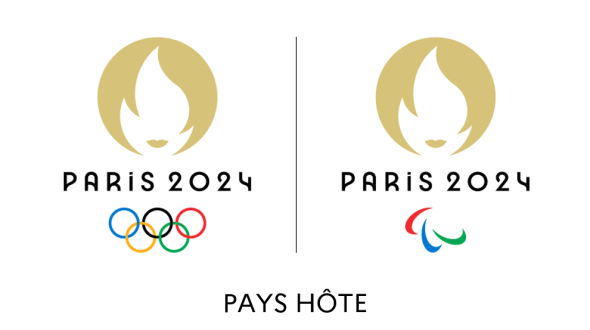
- Paramètres d'affichage
COVID-19 : International travel

Mobilising on a weekly basis up to 6,000 members of the civil security service to carry out tests, border guards to check travellers’ health documents and internal security forces to oversee the isolation or quarantine measures decreed by the prefects, this mechanism was duly adjusted in response to the changing health conditions and Community regulations.
In light of the latest developments in the pandemic, the port health control system has been discontinued, pursuant to the law terminating the emergency measures instituted to combat the COVID-19 outbreak.
Accordingly, the rules previously applied to travellers to France no longer apply effective from 1 August 2022:
- Travellers are now exempt from any formalities prior to entry into France, be it in mainland France or overseas, and no longer required to present a health pass, regardless of the country or place of departure;
- Justification of travel (the “compelling reason”) is no longer required;
- Travellers are no longer required to present a sworn statement of non-contamination and an undertaking to undergo an antigen test or screening upon arrival in the country.
The same applies to travel between mainland France and each of the overseas territories. Similarly, the French authorities no longer require any justification for outgoing travel from France, be it from mainland France or overseas, or any exit clearance to travel to another country.
However, foreign countries may continue to apply specific entry measures and formalities.
As of February 16th 2023, all passengers traveling from China are no longer required to present a negative antigen or PCR test result dated less than 48 hours, or a sworn statement. Random screening on arrival is also discontinued.
It is still recommended to wear a single-use surgical mask on board the aircraft.
Passengers from China making a stopover in a different country to reach France are invited to check the conditions applicable to transits.
Click here to find out more about Overseas Territories Travel.
Suivez-nous sur les réseaux sociaux
Paramètres d’affichage
An official website of the United States government
Here’s how you know
Official websites use .gov A .gov website belongs to an official government organization in the United States.
Secure .gov websites use HTTPS A lock ( Lock Locked padlock icon ) or https:// means you’ve safely connected to the .gov website. Share sensitive information only on official, secure websites.

COVID-19 international travel advisories
Visitors to the U.S. do not need to be tested or vaccinated for COVID-19. U.S. citizens going abroad, check Department of State travel advisories for the country you will visit.
COVID-19 testing and vaccine rules for entering the U.S.
You do not need to show proof of being fully vaccinated against COVID-19 or take a COVID-19 test to enter the U.S. This applies to U.S. citizens and non-citizens.
U.S. citizens traveling to a country outside the U.S.
Find country-specific travel advisories, including COVID-19 restrictions, from the Department of State.
See the CDC's COVID-19 guidance for safer international travel to learn:
- If you can travel if you recently had COVID-19
- What you can do to help prevent COVID-19
LAST UPDATED: May 31, 2024
Have a question?
Ask a real person any government-related question for free. They will get you the answer or let you know where to find it.
France bans unvaccinated U.S. tourists: Here’s what to expect when you travel to the country

Editor's note: This story has been updated as of September 10, 2021, to reflect that France moved the U.S. back to its orange list of countries. Travelers from the U.S. are now subject to stricter entry restrictions. The author traveled to France while the country was on the orange list in June.
As of June 9, 2021, France has reopened its borders to international travelers. Those coming from the U.S. must possess proof of vaccination to the country without mandatory quarantine. As of Sept. 10, unvaccinated U.S. travelers are no longer allowed to enter with proof of a negative COVID-19 test. They are only allowed to enter France for essential reasons as the U.S. has been placed back on France's orange list (more on that below).
I'm a huge fan of France and was ecstatic to hear the reopening news. Naturally, I hopped on one of the first flights to Paris (CDG) that arrived just hours after the new regulations went into effect.
Here, I'll give you a look at my experience entering France under the new coronavirus entry restrictions.
I'll start with a quick overview of what Americans need to bring for entry to France and then discuss my travel experience, from checking in at New York-JFK to clearing customs at Paris (CDG) .
Let's get started!
For more TPG news delivered each morning to your inbox, sign up for our free daily newsletter .
Overview of France's entry requirements (and what to bring)

France implemented a "stoplight" system for tourists entering the country back in June. There are three different colors: green, orange and red. The U.S. is now back on the orange list of countries due to rising coronavirus cases.
Requirements for entering France from the U.S. and other orange countries
You can only enter France from an orange country if you're vaccinated and sign a sworn declaration that you have no symptoms of COVID-19. Here's a look at the vaccine requirements:
- Proof of your vaccination — the following vaccines are accepted:
- AstraZeneca
- Johnson & Johnson
Regardless of where you depart, you must wait a set amount of time after your COVID-19 vaccine in order to enter France. The wait time depends on which vaccine you received:
- Two weeks after the second injection for two injection vaccines (Pfizer, Moderna, AstraZeneca)
- Four weeks after the injection for single injection vaccines (Johnson & Johnson)
- Seven days after injection for vaccines administered to people who have already had COVID-19, only one dose required
Unvaccinated travelers from orange countries are no longer allowed to visit France for non-essential travel. Those with pressing reasons for travel must provide a negative PCR or antigen test taken within 72 and 48 hours of boarding your flight, respectively. Additionally, self-isolation for seven days is mandatory.
Unvaccinated travelers from "green" countries are still allowed to enter France but are subject to test requirements. This includes Canada, the Schengen Area and others.
Note that a digital health pass is now required for many activities in France, including dining at restaurants and cafes. This pass proves that a traveler is fully vaccinated or possesses a recent negative COVID test. Check out TPG's full guide to obtaining a French health pass for more information.
Related: What you need to know about COVID-19 vaccines in the US
My experience flying Delta to Paris
Every trip from the U.S. to France starts with a flight across the Atlantic. I chose to fly Delta Air Lines from New York-JFK to Paris (CDG). Here's a quick look at my check-in and in-flight experience.
When I traveled to France, vaccinated travelers were still required to get a pre-departure COVID-19 test. I went to a CVS Minute Clinic in Manhattan roughly 36 hours prior to departing to get a COVID-19 antigen test. This is referred to as a "rapid test" because it provides results within 20 mins of testing. My test came back negative, but I wasn't surprised as I've been vaccinated against COVID-19 since early March.
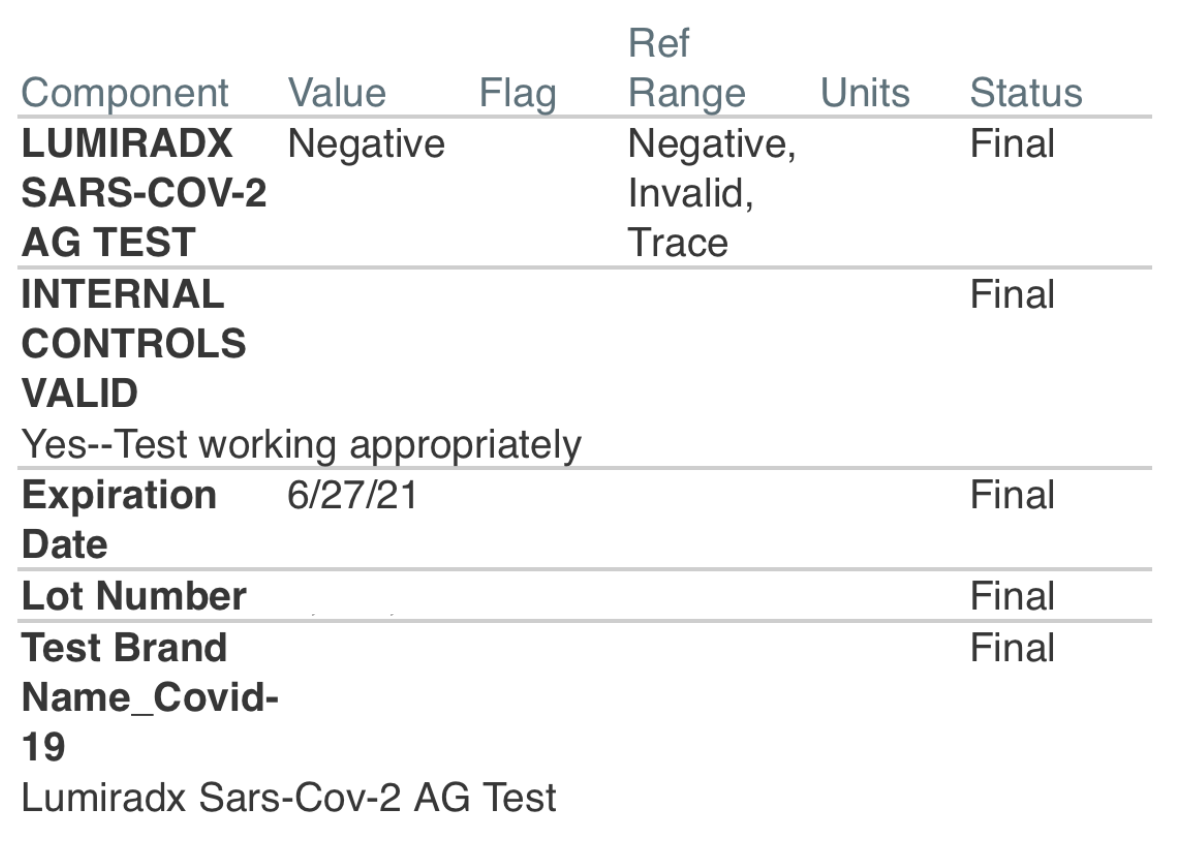
Now for a bit of worry. I attempted to check in to my flight 24-hours before departure, as usual. The Delta app stated that I must have a PCR test that was less than 72 hours old in order to fly to France and it didn't mention an antigen test. While concerning, I chalked this up to outdated app copy, but I was a bit worried as there was no place to get a PCR test in time for my flight.
Again, this wouldn't have been an issue if I traveled under the current requirements for vaccinated travelers.
The next day, I took a Lyft from my home in Queens to JFK airport. I was booked in Delta Main Cabin but used Delta SkyMiles to upgrade my ticket to Delta One , so I used the SkyPriority lane at check-in to get my boarding pass and check a bag.

The process was smooth. The woman at the check-in counter asked if I had a PCR test that was less than 72 hours old. I told her I had an antigen test less than 48 hours old. She checked something on the computer, took my passport and then asked to see my antigen test and COVID-19 vaccine card. She confirmed everything was correct and I was on my way.
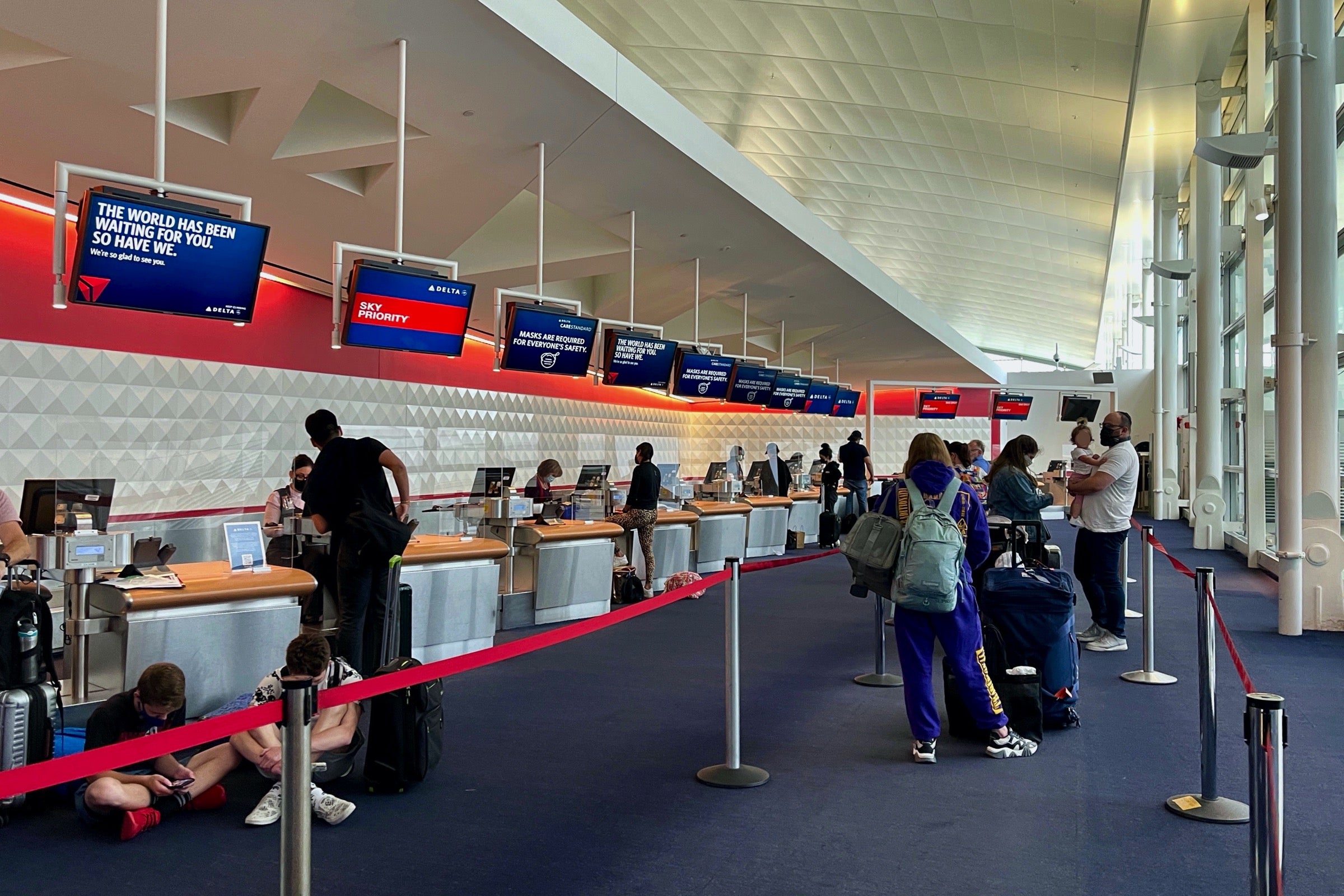
After this, I went to the American Express Centurion Lounge and waited for my flight.

When it was time to board, I walked to my gate and boarded using Delta's touchless, facial-recognition-powered boarding process . No one at the gate asked about my COVID-19 test.
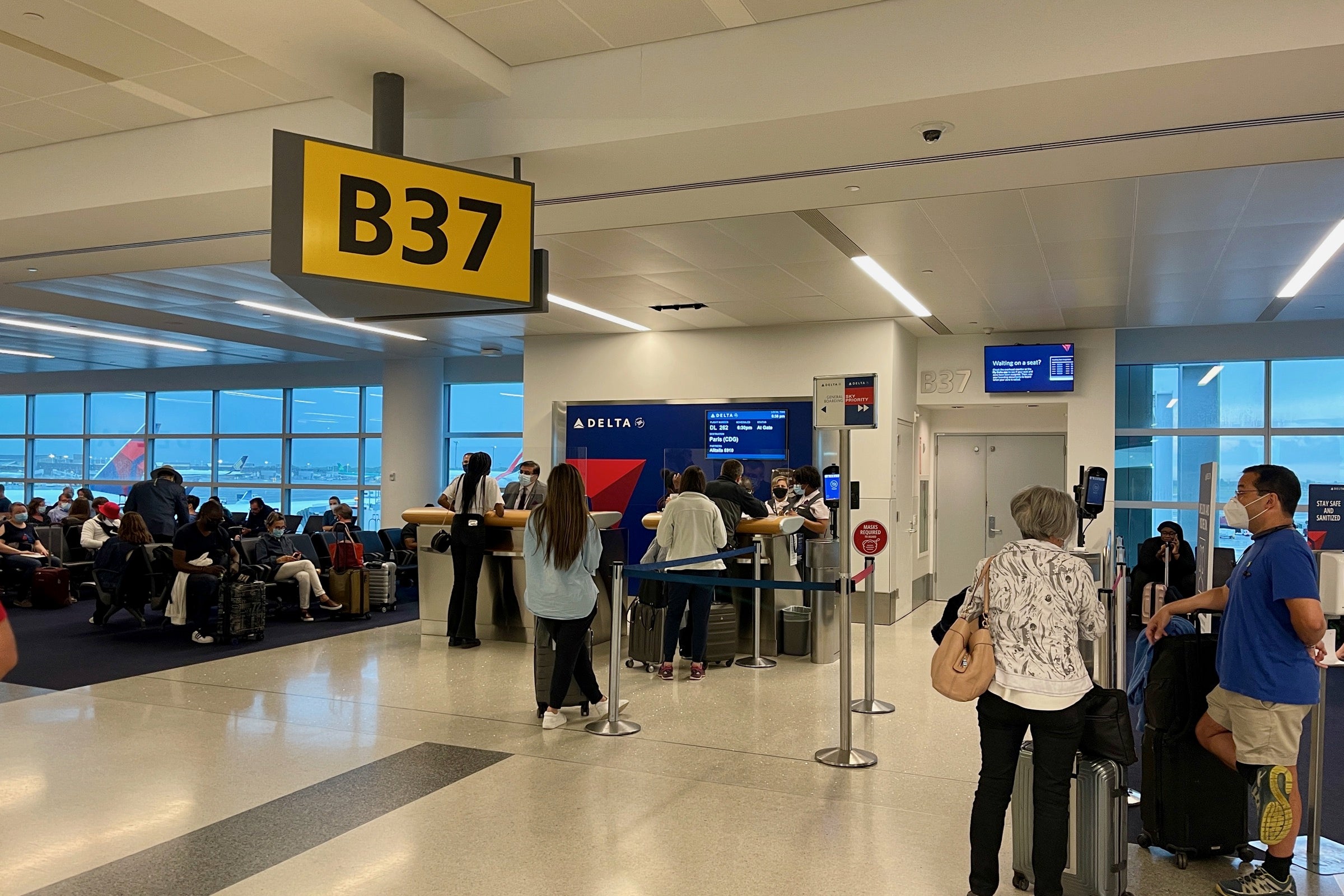
The flight was remarkably packed for a mid-pandemic transatlantic flight. Delta One was almost full and there were many groups of families in the economy cabin. You could sense the excitement in the air.
The flight mostly went on as normal with food and drink service. Plus, the Delta One Suites on the airline's A330-900neo were excellent for working and catching a few hours of sleep en route to Paris.
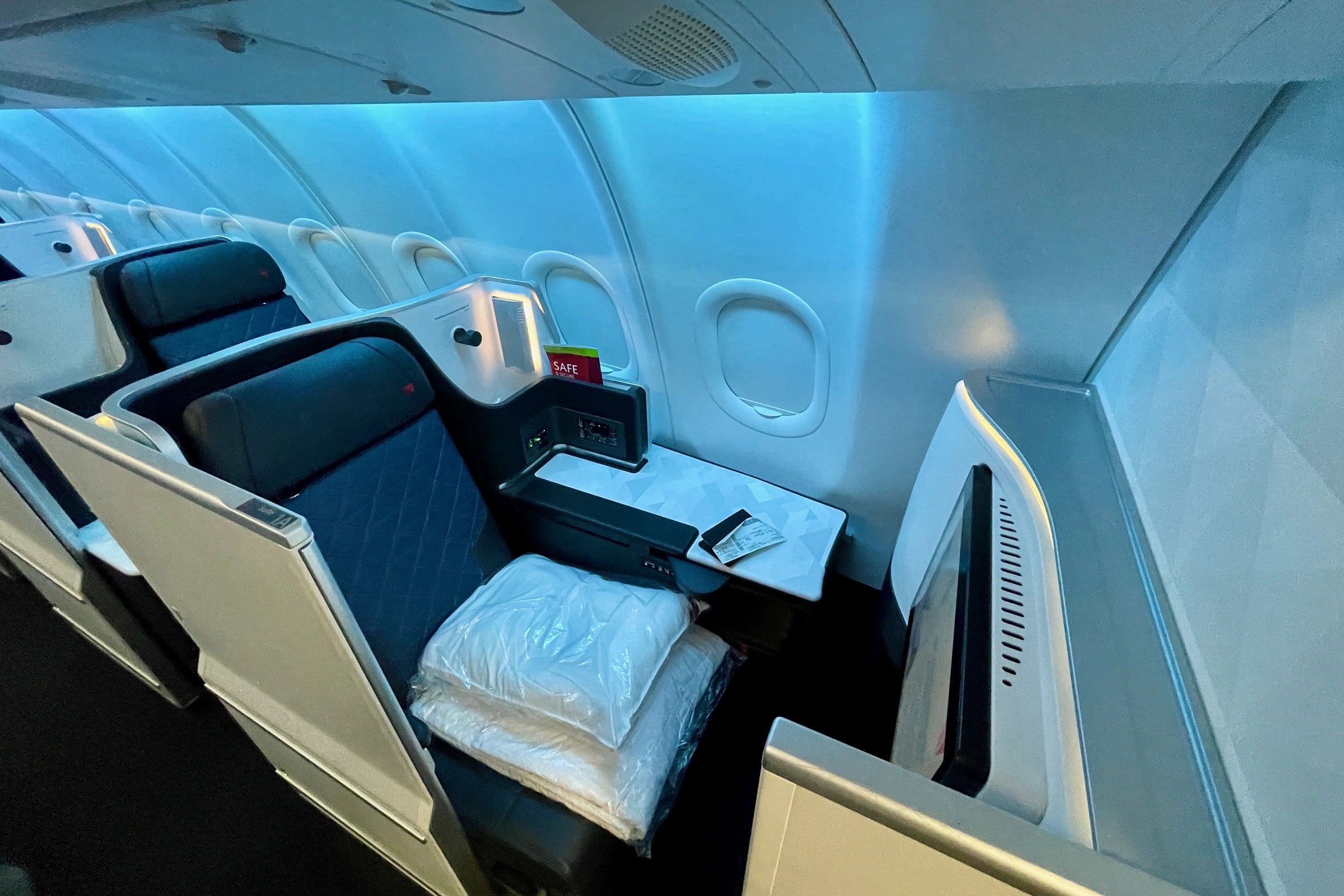
Shortly before arrival, we were given a sworn health declaration to sign and a contact tracing form. The health declaration form would be collected at the border while the flight attendants picked up our contact tracing form before we deplaned.
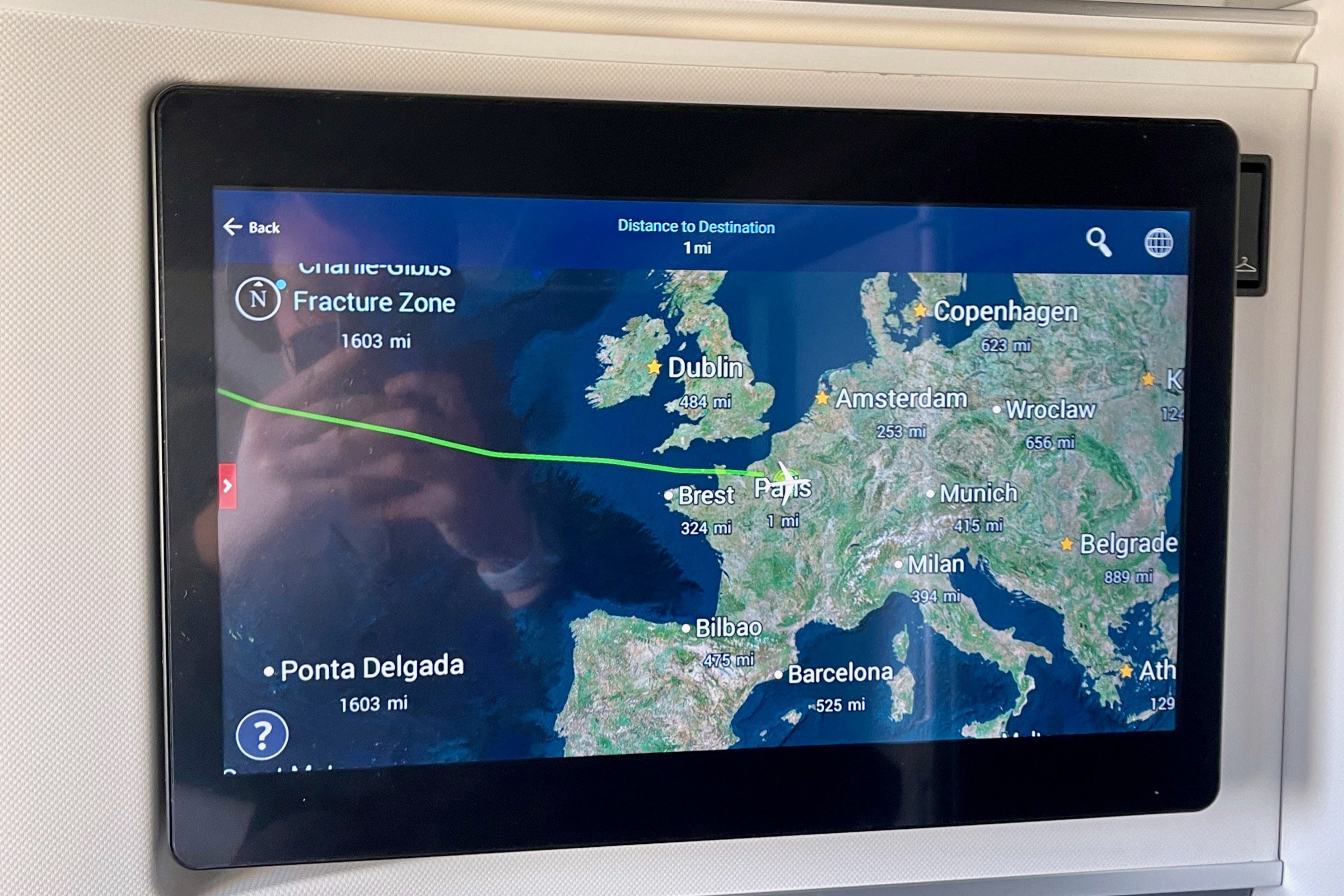
The sworn declaration form may not actually be necessary. It laid out old entry rules (mandatory PCR test, seven-day quarantine) and asked you to sign a note saying you have no COVID-19 symptoms and will obey the quarantine. I signed, but border control never asked for my form.
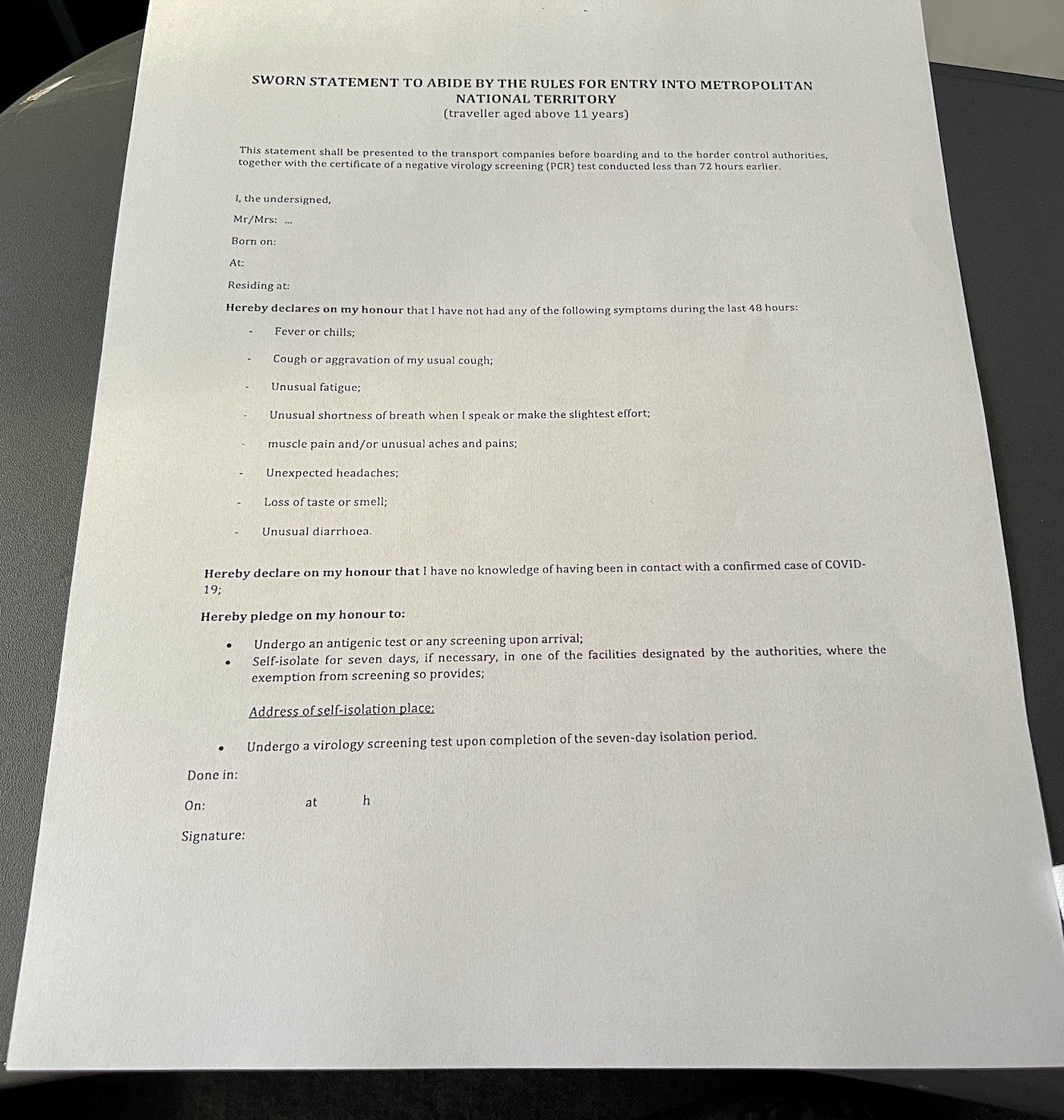
The contact-tracing form was very straightforward too. It just asked for simple information like your flight number, hotel address and other basics.
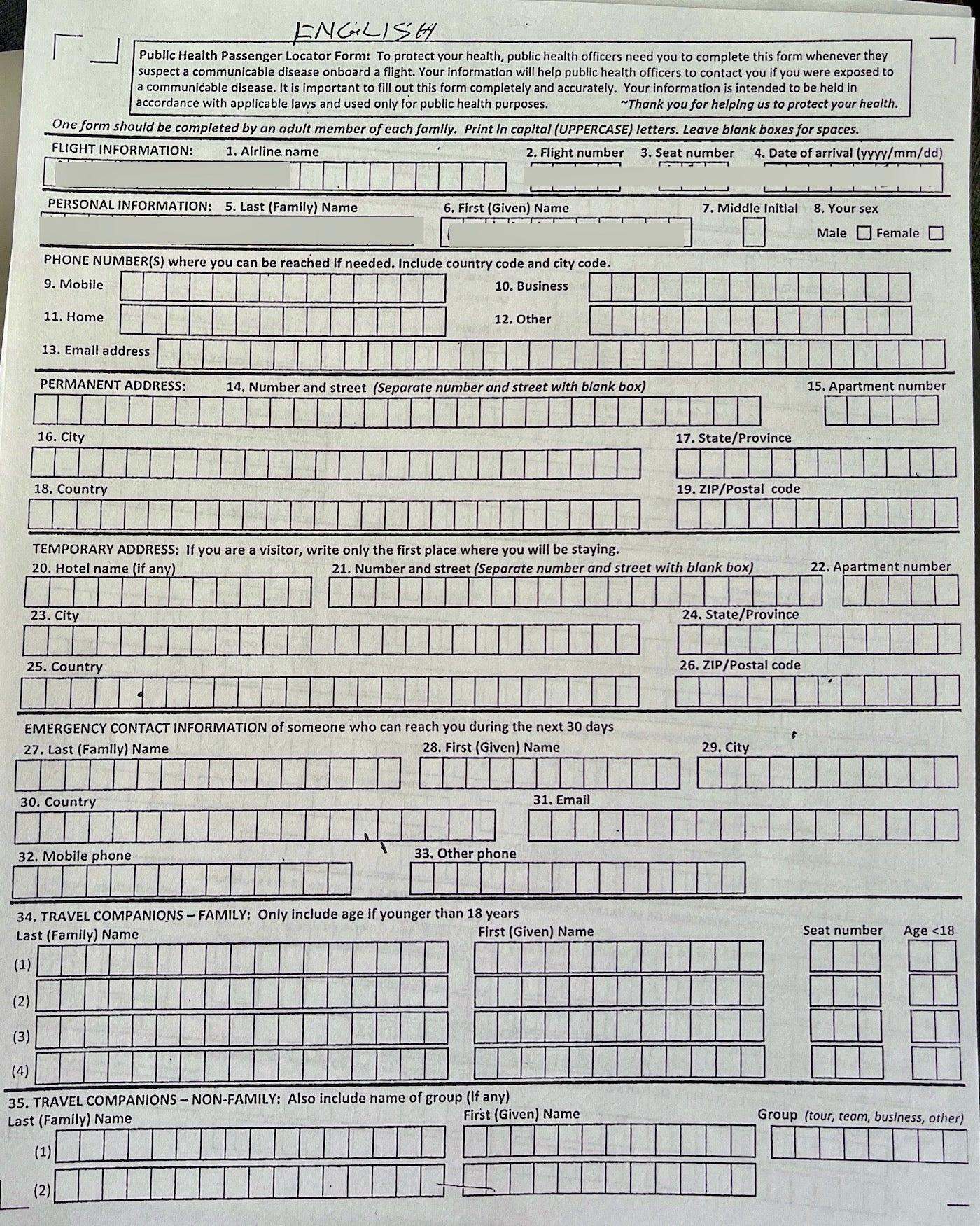
Related: Delta becomes first major carrier to launch contact tracing initiative
Experience at the French border
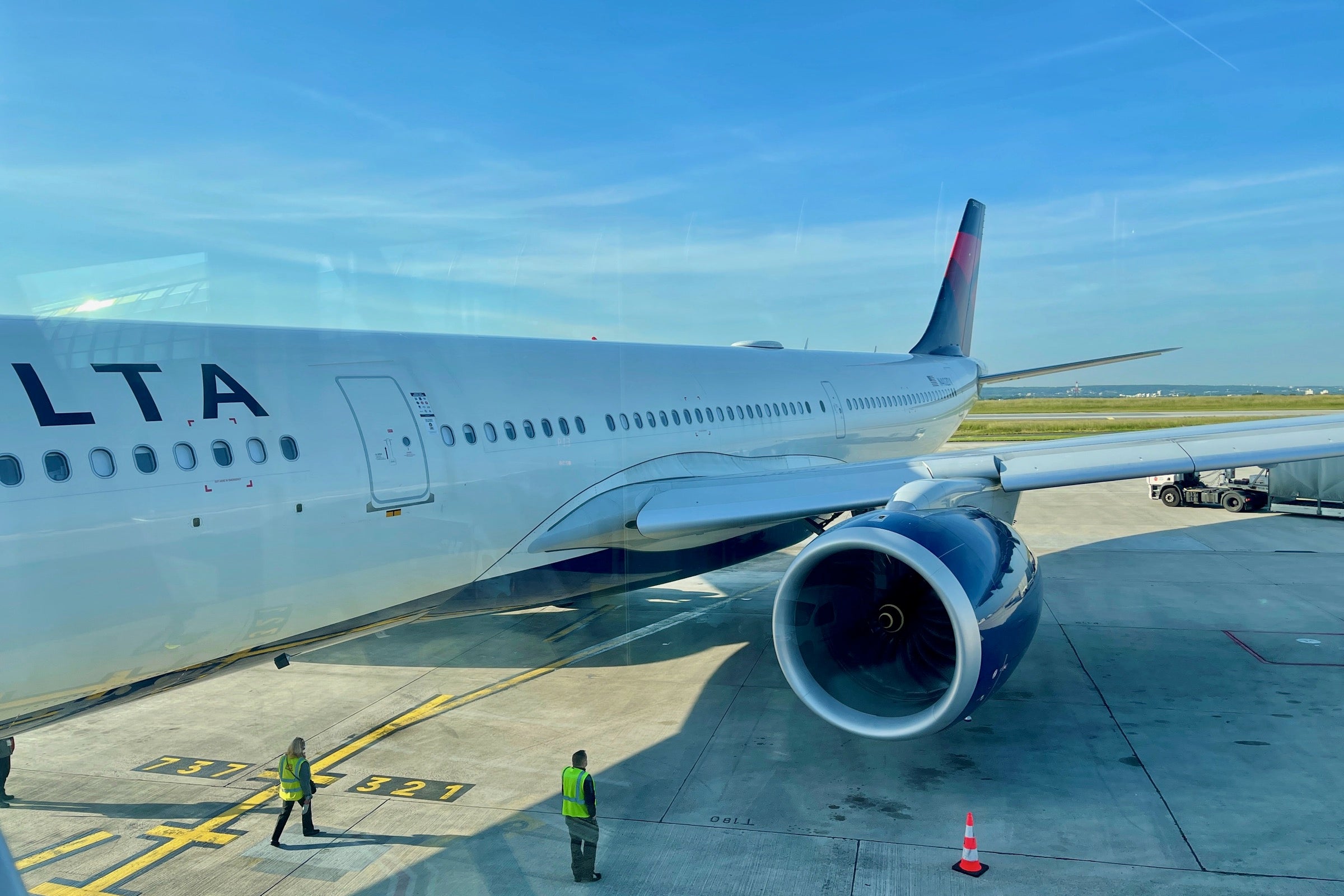
I was one of the first off the plane in Paris (CDG) after landing since I was in the first row of Delta One. I walked through a series of hallways until I reached the border control area, where three immigration desks were open. There was already a short line since a couple of other flights had come in at the same time as ours.
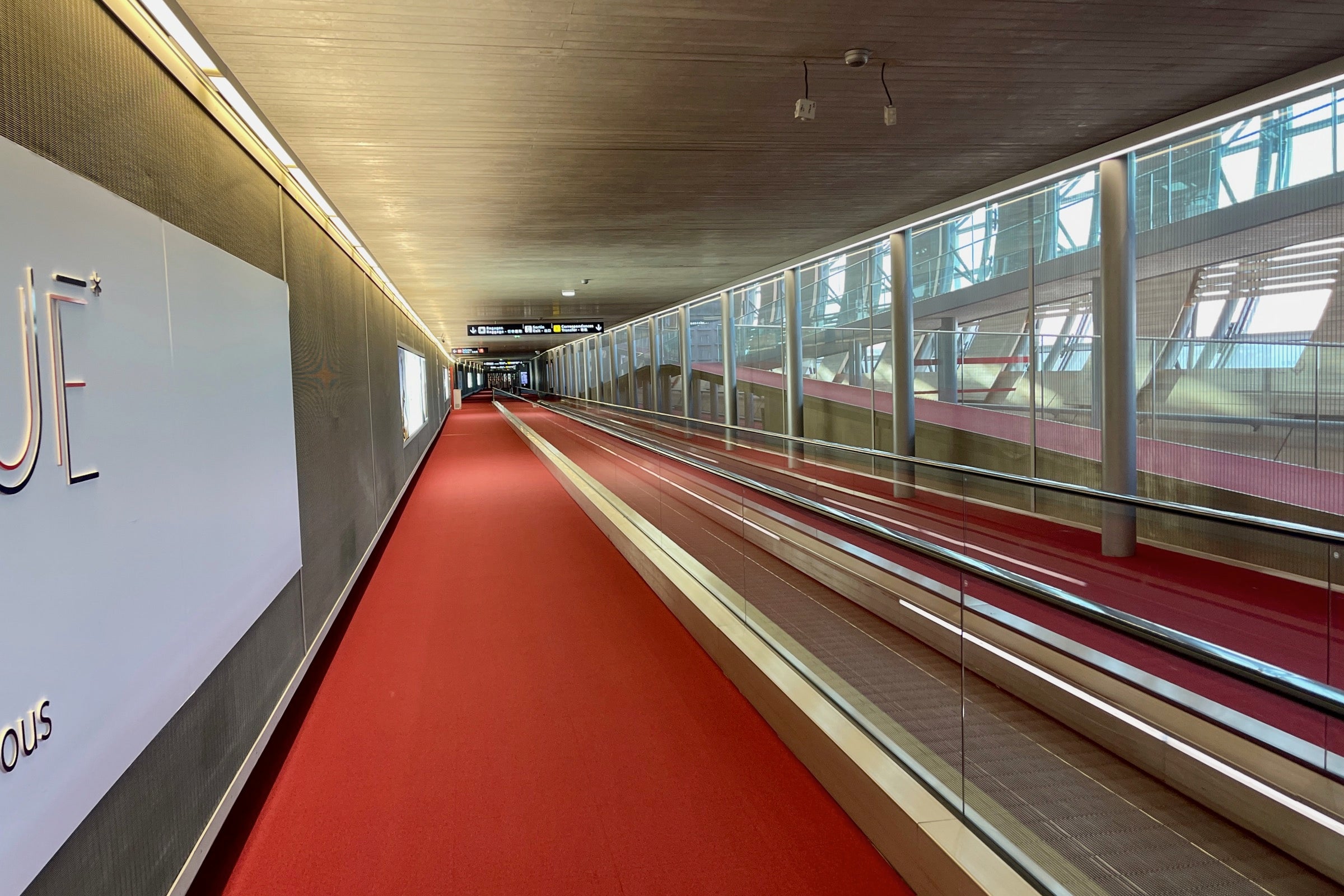
It only took 10 minutes for me to get to the front of the line. Even though I have a European passport , I opted to use my U.S. passport to enter France, so I could better report on my experience in this article.
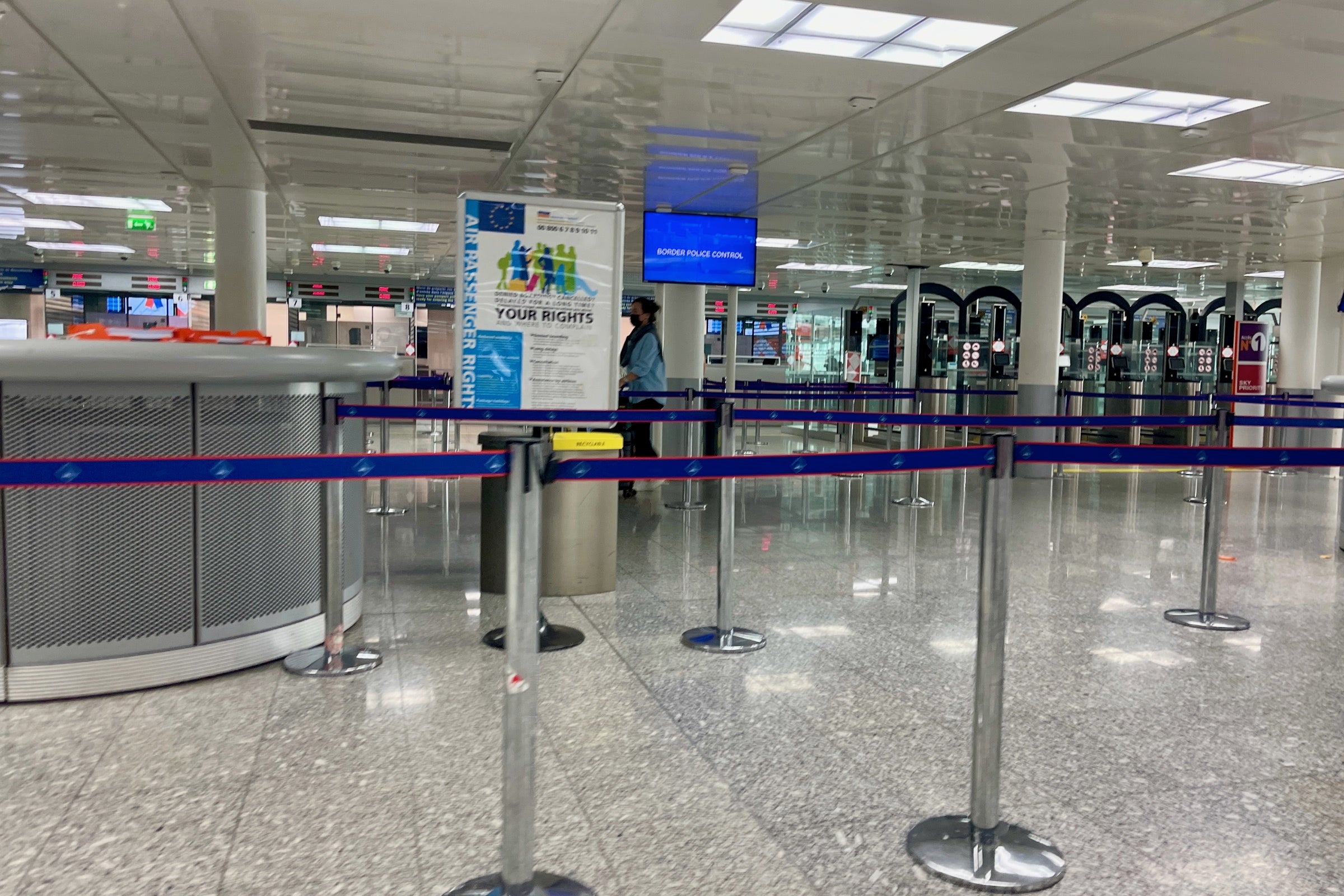
Thankfully, it was a seamless experience.
I handed the border control agent my passport, CDC-issued COVID-19 vaccine card , sworn declaration and my phone that displayed my negative test results. She looked at the documents, handed me back my sworn declaration and stamped my passport. And that was it: I was in the country.
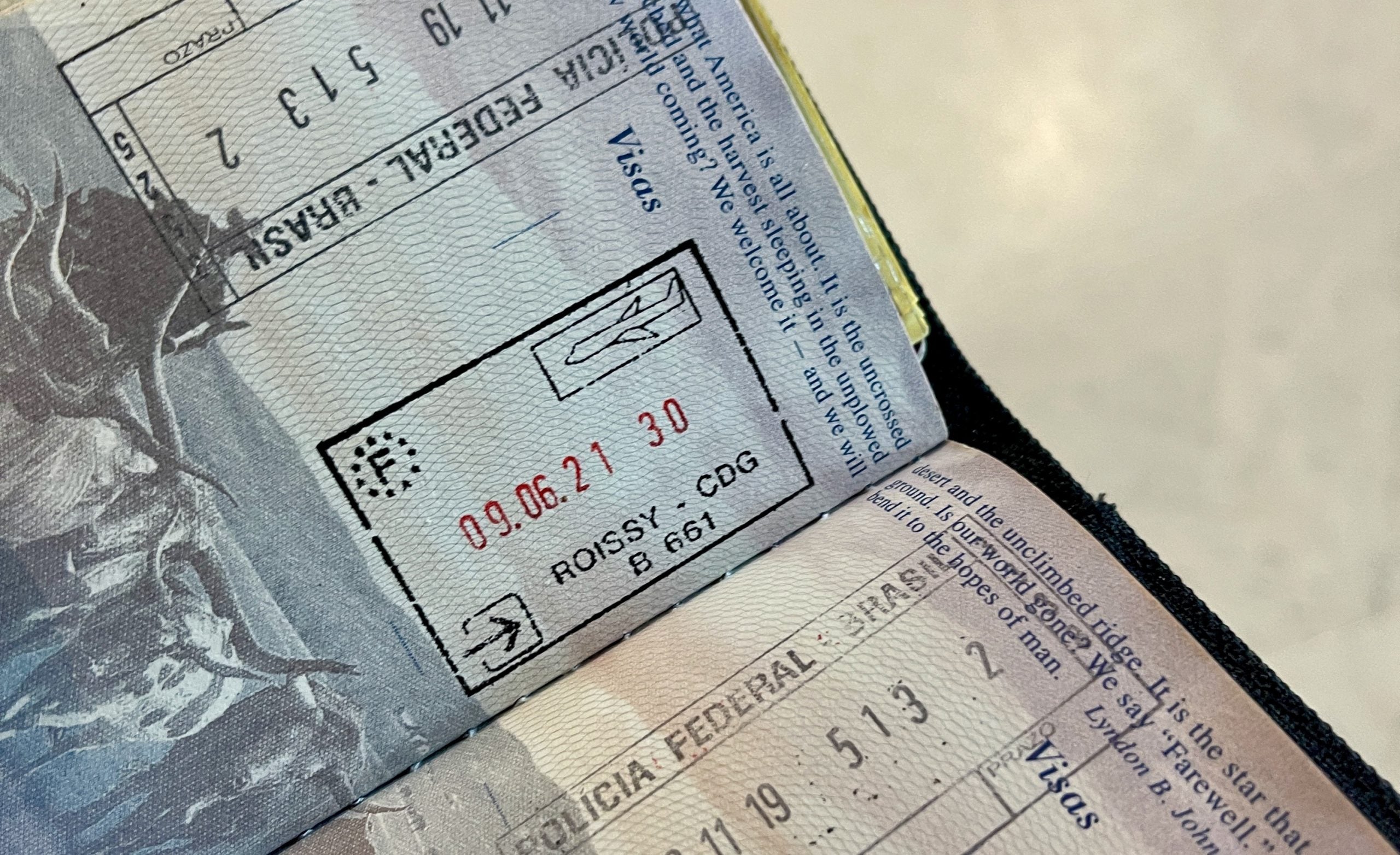
This was in stark contrast to Iceland , where I waited for border control agents to discuss whether or not I should be allowed in. Here, there was barely any communication. The friendly border agent just checked my documents and waved me through.
After this, I took a deep breath of relief, collected my bag and requested an Uber to my hotel in Paris. Trust me, the excitement set in quickly.

Related: When will international travel return? A country-by-country guide to coronavirus recovery
Checking into my hotel
Also, unlike Iceland, checking into my first hotel in Paris was no different than pre-pandemic times. I was not asked for proof of vaccination or other paperwork, though this may be different now that a health pass is required for many activities. All I had to do was give the front desk clerk my passport and credit card.

Funny enough, another American was checking in after me. I could tell the hotel staff was equally as excited about today's reopening. The front desk clerk happily told us we picked the perfect day to visit, as all restaurants are reopening for indoor dining.
Related: 15 things to see and do on your first trip to Paris
Bottom line
Traveling from the U.S. to France is possible under relaxed border rules, and it's remarkably easy to do. Just wait long enough post-vaccine and you should be good to go.
Because of this simplicity and all that France has to offer, I think we'll see American tourism to France continue to rebound through the end of the year. I highly recommend you make the trip too — especially now that nightly curfew and other restrictions are lifted.
Feature photo by Nikada/Getty Images
You are using an outdated browser. Upgrade your browser today or install Google Chrome Frame to better experience this site.
France Traveler View
The 2024 Summer Olympics will take place in Paris, France, from July 26-August 11, 2024. The Paralympic Games is scheduled for August 28-September 8, 2024. Crowds are expected at these events, and mass gatherings are associated with unique health risks. If you plan to travel to Paris for these events, visit a travel health specialist at least 4-6 weeks before you go to make sure you are up to date on routine and recommended vaccines . The celebratory atmosphere at the Olympics may encourage travelers to engage in risky behaviors, including risky sex. If you have sex with new partners during your trip, take steps to protect one another. Monitor travel warnings and alerts from the U.S. Department of State and consider signing up for the Smart Travelers Enrollment Program .
Travel Health Notices
Vaccines and medicines, non-vaccine-preventable diseases, stay healthy and safe.
- Packing List
After Your Trip
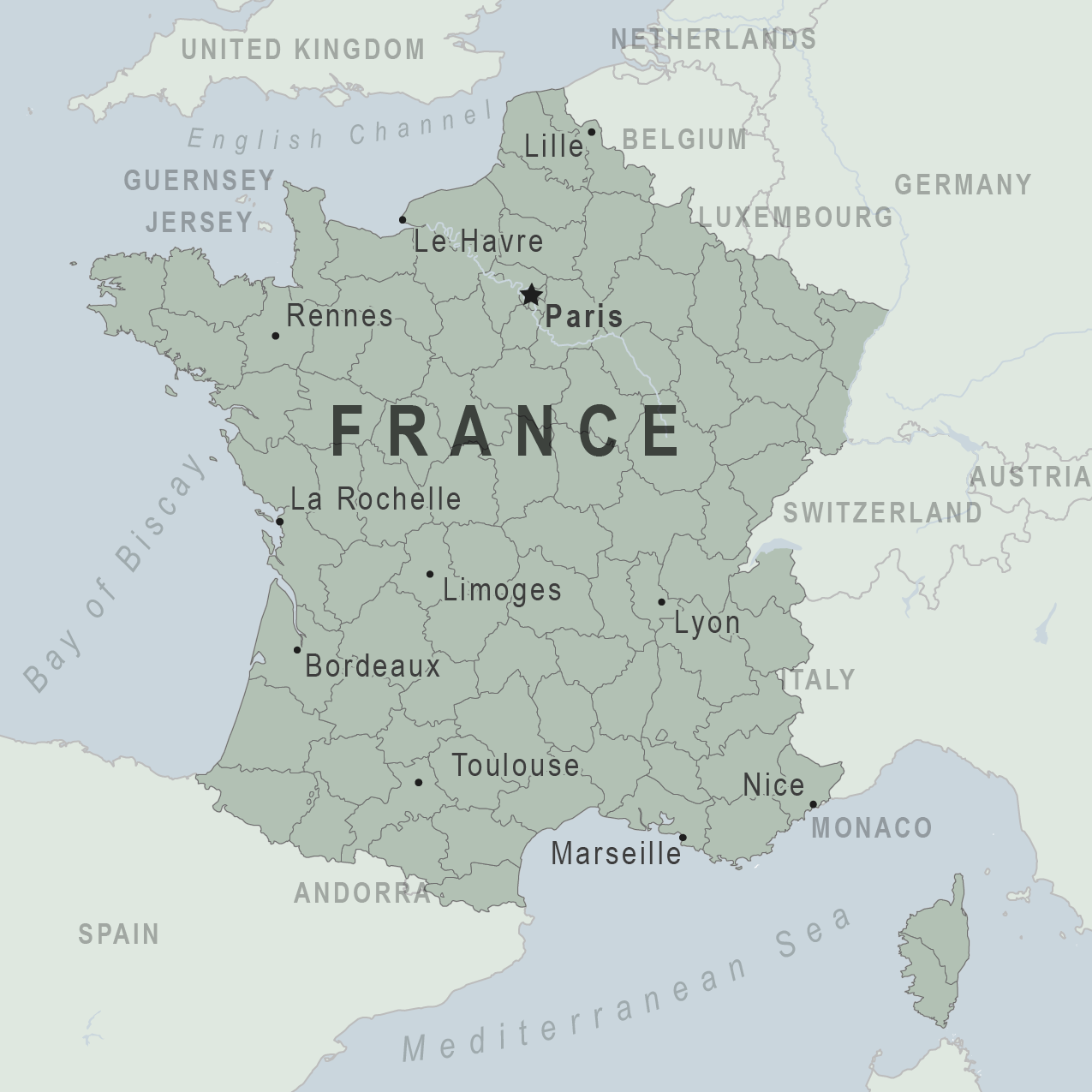
There are no notices currently in effect for France.
⇧ Top
Check the vaccines and medicines list and visit your doctor at least a month before your trip to get vaccines or medicines you may need. If you or your doctor need help finding a location that provides certain vaccines or medicines, visit the Find a Clinic page.
Routine vaccines
Recommendations.
Make sure you are up-to-date on all routine vaccines before every trip. Some of these vaccines include
- Chickenpox (Varicella)
- Diphtheria-Tetanus-Pertussis
- Flu (influenza)
- Measles-Mumps-Rubella (MMR)
Immunization schedules
All eligible travelers should be up to date with their COVID-19 vaccines. Please see Your COVID-19 Vaccination for more information.
COVID-19 vaccine
Hepatitis A
Consider hepatitis A vaccination for most travelers. It is recommended for travelers who will be doing higher risk activities, such as visiting smaller cities, villages, or rural areas where a traveler might get infected through food or water. It is recommended for travelers who plan on eating street food.
Hepatitis A - CDC Yellow Book
Dosing info - Hep A
Hepatitis B
Recommended for unvaccinated travelers younger than 60 years old traveling to France. Unvaccinated travelers 60 years and older may get vaccinated before traveling to France.
Hepatitis B - CDC Yellow Book
Dosing info - Hep B
Cases of measles are on the rise worldwide. Travelers are at risk of measles if they have not been fully vaccinated at least two weeks prior to departure, or have not had measles in the past, and travel internationally to areas where measles is spreading.
All international travelers should be fully vaccinated against measles with the measles-mumps-rubella (MMR) vaccine, including an early dose for infants 6–11 months, according to CDC’s measles vaccination recommendations for international travel .
Measles (Rubeola) - CDC Yellow Book
Dogs infected with rabies are not commonly found in France.
If rabies exposures occur while in France, rabies vaccines are typically available throughout most of the country.
Rabies pre-exposure vaccination considerations include whether travelers 1) will be performing occupational or recreational activities that increase risk for exposure to potentially rabid animals and 2) might have difficulty getting prompt access to safe post-exposure prophylaxis.
Please consult with a healthcare provider to determine whether you should receive pre-exposure vaccination before travel.
For more information, see country rabies status assessments .
Rabies - CDC Yellow Book
Tick-borne Encephalitis
Avoid bug bites.
Learn more about tick-borne encephalitis at your destination .
Tick-borne Encephalitis - CDC Yellow Book
Avoid contaminated water
Leptospirosis
How most people get sick (most common modes of transmission)
- Touching urine or other body fluids from an animal infected with leptospirosis
- Swimming or wading in urine-contaminated fresh water, or contact with urine-contaminated mud
- Drinking water or eating food contaminated with animal urine
- Avoid contaminated water and soil
- Avoid floodwater
Clinical Guidance
Leishmaniasis
- Sand fly bite
- Avoid Bug Bites
- Mosquito bite
- An infected pregnant woman can spread it to her unborn baby

Airborne & droplet
- Breathing in air or accidentally eating food contaminated with the urine, droppings, or saliva of infected rodents
- Bite from an infected rodent
- Less commonly, being around someone sick with hantavirus (only occurs with Andes virus)
- Avoid rodents and areas where they live
- Avoid sick people
Parvovirus B19
- Virus droplets from a cough or sneeze getting in your eyes, nose, or mouth
- Direct contact with the virus, like kissing the face of a child with parvovirus B19
- Touching a surface with the virus on it, like a doorknob, and then touching your face before washing your hands
- An infected pregnant person can spread it to their unborn baby
- Wash your hands often with soap and water
- Avoid touching your eyes, nose, and mouth
- Avoid crowded areas where you may be unable to maintain physical distance
- People who are pregnant , have blood disorders (e.g. sickle cell or thalassemia), or are immunocompromised are at higher risk for severe disease. If you are in these groups and are exposed to or contract parvovirus B-19, contact your healthcare provider.
Prevention and Treatment
Tuberculosis (TB)
- Breathe in TB bacteria that is in the air from an infected and contagious person coughing, speaking, or singing.
Learn actions you can take to stay healthy and safe on your trip. Vaccines cannot protect you from many diseases in France, so your behaviors are important.
Eat and drink safely
Food and water standards around the world vary based on the destination. Standards may also differ within a country and risk may change depending on activity type (e.g., hiking versus business trip). You can learn more about safe food and drink choices when traveling by accessing the resources below.
- Choose Safe Food and Drinks When Traveling
- Water Treatment Options When Hiking, Camping or Traveling
- Global Water, Sanitation and Hygiene | Healthy Water
- Avoid Contaminated Water During Travel
You can also visit the Department of State Country Information Pages for additional information about food and water safety.
Prevent bug bites
Although France is an industrialized country, bug bites here can still spread diseases. Just as you would in the United States, try to avoid bug bites while spending time outside or in wooded areas.
What can I do to prevent bug bites?
- Cover exposed skin by wearing long-sleeved shirts, long pants, and hats.
- Use an appropriate insect repellent (see below).
- Consider using permethrin-treated clothing and gear if spending a lot of time outside. Do not use permethrin directly on skin.
What type of insect repellent should I use?
- FOR PROTECTION AGAINST TICKS AND MOSQUITOES: Use a repellent that contains 20% or more DEET for protection that lasts up to several hours.
- Picaridin (also known as KBR 3023, Bayrepel, and icaridin)
- Oil of lemon eucalyptus (OLE) or para-menthane-diol (PMD)
- 2-undecanone
- Always use insect repellent as directed.
What should I do if I am bitten by bugs?
- Avoid scratching bug bites, and apply hydrocortisone cream or calamine lotion to reduce the itching.
- Check your entire body for ticks after outdoor activity. Be sure to remove ticks properly.
What can I do to avoid bed bugs?
Although bed bugs do not carry disease, they are an annoyance. See our information page about avoiding bug bites for some easy tips to avoid them. For more information on bed bugs, see Bed Bugs .
For more detailed information on avoiding bug bites, see Avoid Bug Bites .
Stay safe outdoors
If your travel plans in France include outdoor activities, take these steps to stay safe and healthy during your trip:
- Stay alert to changing weather conditions and adjust your plans if conditions become unsafe.
- Prepare for activities by wearing the right clothes and packing protective items, such as bug spray, sunscreen, and a basic first aid kit.
- Consider learning basic first aid and CPR before travel. Bring a travel health kit with items appropriate for your activities.
- If you are outside for many hours in the heat, eat salty snacks and drink water to stay hydrated and replace salt lost through sweating.
- Protect yourself from UV radiation : use sunscreen with an SPF of at least 15, wear protective clothing, and seek shade during the hottest time of day (10 a.m.–4 p.m.).
- Be especially careful during summer months and at high elevation. Because sunlight reflects off snow, sand, and water, sun exposure may be increased during activities like skiing, swimming, and sailing.
- Very cold temperatures can be dangerous. Dress in layers and cover heads, hands, and feet properly if you are visiting a cold location.
Stay safe around water
- Swim only in designated swimming areas. Obey lifeguards and warning flags on beaches.
- Do not dive into shallow water.
- Avoid swallowing water when swimming. Untreated water can carry germs that make you sick.
- Practice safe boating—follow all boating safety laws, do not drink alcohol if you are driving a boat, and always wear a life jacket.
Keep away from animals
Most animals avoid people, but they may attack if they feel threatened, are protecting their young or territory, or if they are injured or ill. Animal bites and scratches can lead to serious diseases such as rabies.
Follow these tips to protect yourself:
- Do not touch or feed any animals you do not know.
- Do not allow animals to lick open wounds, and do not get animal saliva in your eyes or mouth.
- Avoid rodents and their urine and feces.
- Traveling pets should be supervised closely and not allowed to come in contact with local animals.
- If you wake in a room with a bat, seek medical care immediately. Bat bites may be hard to see.
All animals can pose a threat, but be extra careful around dogs, bats, monkeys, sea animals such as jellyfish, and snakes. If you are bitten or scratched by an animal, immediately:
- Wash the wound with soap and clean water.
- Go to a doctor right away.
- Tell your doctor about your injury when you get back to the United States.
Reduce your exposure to germs
Follow these tips to avoid getting sick or spreading illness to others while traveling:
- Wash your hands often, especially before eating.
- If soap and water aren’t available, clean hands with hand sanitizer (containing at least 60% alcohol).
- Don’t touch your eyes, nose, or mouth. If you need to touch your face, make sure your hands are clean.
- Cover your mouth and nose with a tissue or your sleeve (not your hands) when coughing or sneezing.
- Try to avoid contact with people who are sick.
- If you are sick, stay home or in your hotel room, unless you need medical care.
Avoid sharing body fluids
Diseases can be spread through body fluids, such as saliva, blood, vomit, and semen.
Protect yourself:
- Use latex condoms correctly.
- Do not inject drugs.
- Limit alcohol consumption. People take more risks when intoxicated.
- Do not share needles or any devices that can break the skin. That includes needles for tattoos, piercings, and acupuncture.
- If you receive medical or dental care, make sure the equipment is disinfected or sanitized.
Know how to get medical care while traveling
Plan for how you will get health care during your trip, should the need arise:
- Carry a list of local doctors and hospitals at your destination.
- Review your health insurance plan to determine what medical services it would cover during your trip. Consider purchasing travel health and medical evacuation insurance for things your regular insurance will not cover.
- Carry a card that identifies, in the local language, your blood type, chronic conditions or serious allergies, and the generic names of any medicines you take.
- Bring copies of your prescriptions for medicine and for eye glasses and contact lenses.
- Some prescription drugs may be illegal in other countries. Call France’s embassy to verify that all of your prescription(s) are legal to bring with you.
- Bring all the medicines (including over-the-counter medicines) you think you might need during your trip, including extra in case of travel delays. Ask your doctor to help you get prescriptions filled early if you need to.
Many foreign hospitals and clinics are accredited by the Joint Commission International. A list of accredited facilities is available at their website ( www.jointcommissioninternational.org ).
Select safe transportation
Motor vehicle crashes are the #1 killer of healthy US citizens in foreign countries.
Be smart when you are traveling on foot.
- Use sidewalks and marked crosswalks.
- Pay attention to the traffic around you, especially in crowded areas.
- Remember, people on foot do not always have the right of way in other countries.
Riding/Driving
Choose a safe vehicle.
- Choose official taxis or public transportation, such as trains and buses.
- Make sure there are seatbelts.
- Avoid overcrowded, overloaded, top-heavy buses and minivans.
- Avoid riding on motorcycles or motorbikes, especially motorbike taxis. (Many crashes are caused by inexperienced motorbike drivers.)
- Choose newer vehicles—they may have more safety features, such as airbags, and be more reliable.
- Choose larger vehicles, which may provide more protection in crashes.
Think about the driver.
- Do not drive after drinking alcohol or ride with someone who has been drinking.
- Consider hiring a licensed, trained driver familiar with the area.
- Arrange payment before departing.
Follow basic safety tips.
- Wear a seatbelt at all times.
- Sit in the back seat of cars and taxis.
- When on motorbikes or bicycles, always wear a helmet. (Bring a helmet from home, if needed.)
- Do not use a cell phone or text while driving (illegal in many countries).
- Travel during daylight hours only, especially in rural areas.
- If you choose to drive a vehicle in France, learn the local traffic laws and have the proper paperwork.
- Get any driving permits and insurance you may need. Get an International Driving Permit (IDP). Carry the IDP and a US-issued driver's license at all times.
- Check with your auto insurance policy's international coverage, and get more coverage if needed. Make sure you have liability insurance.
- Avoid using local, unscheduled aircraft.
- If possible, fly on larger planes (more than 30 seats); larger airplanes are more likely to have regular safety inspections.
- Try to schedule flights during daylight hours and in good weather.
Helpful Resources
Road Safety Overseas (Information from the US Department of State): Includes tips on driving in other countries, International Driving Permits, auto insurance, and other resources.
The Association for International Road Travel has country-specific Road Travel Reports available for most countries for a minimal fee.
Maintain personal security
Use the same common sense traveling overseas that you would at home, and always stay alert and aware of your surroundings.
Before you leave
- Research your destination(s), including local laws, customs, and culture.
- Monitor travel advisories and alerts and read travel tips from the US Department of State.
- Enroll in the Smart Traveler Enrollment Program (STEP) .
- Leave a copy of your itinerary, contact information, credit cards, and passport with someone at home.
- Pack as light as possible, and leave at home any item you could not replace.
While at your destination(s)
- Carry contact information for the nearest US embassy or consulate .
- Carry a photocopy of your passport and entry stamp; leave the actual passport securely in your hotel.
- Follow all local laws and social customs.
- Do not wear expensive clothing or jewelry.
- Always keep hotel doors locked, and store valuables in secure areas.
- If possible, choose hotel rooms between the 2nd and 6th floors.
Healthy Travel Packing List
Use the Healthy Travel Packing List for France for a list of health-related items to consider packing for your trip. Talk to your doctor about which items are most important for you.
Why does CDC recommend packing these health-related items?
It’s best to be prepared to prevent and treat common illnesses and injuries. Some supplies and medicines may be difficult to find at your destination, may have different names, or may have different ingredients than what you normally use.
If you are not feeling well after your trip, you may need to see a doctor. If you need help finding a travel medicine specialist, see Find a Clinic . Be sure to tell your doctor about your travel, including where you went and what you did on your trip. Also tell your doctor if you were bitten or scratched by an animal while traveling.
For more information on what to do if you are sick after your trip, see Getting Sick after Travel .
Map Disclaimer - The boundaries and names shown and the designations used on maps do not imply the expression of any opinion whatsoever on the part of the Centers for Disease Control and Prevention concerning the legal status of any country, territory, city or area or of its authorities, or concerning the delimitation of its frontiers or boundaries. Approximate border lines for which there may not yet be full agreement are generally marked.
Other Destinations
If you need help finding travel information:
Message & data rates may apply. CDC Privacy Policy
File Formats Help:
- Adobe PDF file
- Microsoft PowerPoint file
- Microsoft Word file
- Microsoft Excel file
- Audio/Video file
- Apple Quicktime file
- RealPlayer file
- Zip Archive file
Exit Notification / Disclaimer Policy
- The Centers for Disease Control and Prevention (CDC) cannot attest to the accuracy of a non-federal website.
- Linking to a non-federal website does not constitute an endorsement by CDC or any of its employees of the sponsors or the information and products presented on the website.
- You will be subject to the destination website's privacy policy when you follow the link.
- CDC is not responsible for Section 508 compliance (accessibility) on other federal or private website.
11 things only the locals know in France (and now you do too)

May 7, 2024 • 6 min read
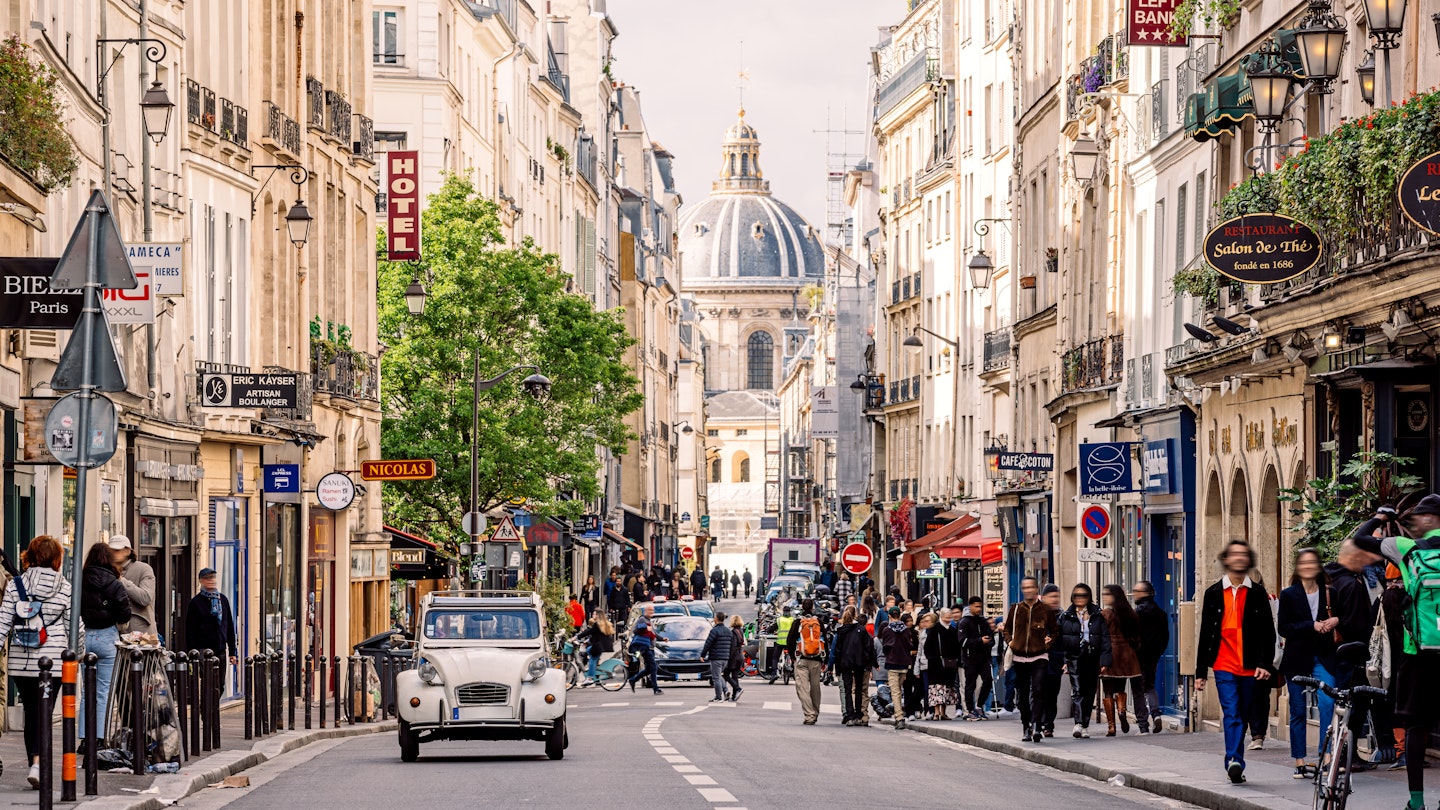
France is an incredible place to explore, especially when you know these do's and don'ts © Alexander Spatari / Getty Images © Alexander Spatari / Getty Images
One kiss or two? Anna Richards, one of the authors of the new Lonely Planet France guidebook , shares her tips to avoid some common French faux pas.
Even if you’ve never been to France before, it’s easy to think you know it — Parisian rom-com scenes are six to a dozen. On screen and real life are very different, though. There’s an unflattering reputation that the French are unfriendly, but in my experience, you’re probably just making a cultural faux pas. I’ve lived here for three years: here’s what you need to know before visiting France, and how not to get shouted at on the Metro.
1. Pay attention to tourist laws in France
EU residents can come and go as they please, but non-EU nationals (including those holding British and American passports) have the right to stay in France for up to 90 days within the period of 180 days, visa free (your passport is stamped upon arrival and exit). You’ll need three months of validity left on your passport from your intended departure date. The full list of visa requirements according to country can be found here .
Be aware of import and export rules. That stinky, unpasteurized cheese might seem like the perfect way to cover up the stench of your week-old socks, but if you’re leaving the EU, it’s not allowed.
2. Keep ID on hand
You don’t have to always have your passport, but you should carry photo ID as the police have the right to demand it (although it’s rare). You’ll need your passport for international border arrivals, and your hotel or hostel will often ask for it at check-in too. If you don’t have it on your person, it’s a good idea to have a scan to hand.
3. France isn't paperless – yet
France has not embraced contactless card payments with the same zealousness as the UK, and it’s not possible to pay with contactless in some pretty surprising places, including Paris Metro. The Metro in other cities in the country (including Lyon) does accept contactless card payments, but Paris still resolutely uses paper tickets or a rechargeable Navigo card. In rural France, I recommend still carrying some cash. Even if you can pay by card in most places, there’s often a minimum spend, which I’ve known to be as high as €40.

4. Driving can be pricey
Driving can be eye-wateringly expensive, particularly on the motorways, where péages (tolls) often cost the same or more than your fuel. Calculate the cost of your journey on ViaMichelin to see whether it makes sense to avoid toll roads and consider sharing your ride on BlablaCar (a bus and carpooling platform) to mitigate the cost of your journey.
5. You'll need to navigate varying opening hours
Get wise to the opening hours, particularly in rural areas. From Sunday–Tuesday, a lot of shops, restaurants and attractions are closed. Smaller shops and the post office often close over lunch, regardless of the day of the week. Watch out for seasonality, too, as the French holiday en masse. At the start and end of the school holidays, roads (particularly those to the south) grind to a standstill. Outside of travel season, you may find a lot of accommodation, restaurants and attractions to be closed, regardless of the day of the week.

6. Say your hellos and goodbyes
La bise (kiss) was threatened during Covid-19, but it's firmly back. How many kisses to give depends on the area of the country. In most of France, two kisses are the norm, but in parts of the south and south west it’s three, and in certain departments, like the Yonne and Aube, four. People who still prefer to socially distance may offer you a fist bump or an air kiss instead.
Say bonjour or bonsoir (hello or good evening) to everyone, and bonne journée or bonne soirée (have a good day/evening) as you leave. Don’t think you can slip away at a party either. It’s generally expected to greet, and say goodbye to, everyone at a gathering. Yes, this can be time-consuming.
7. Skip the athleisure wear
Don’t wander around in your gym kit. The French tend to dress chic, and spending the day in sportswear isn’t a thing. Many French people won’t even bother with sports clothes for a cycle commute, unless they’re hardcore cyclists in head-to-toe Lycra and clip shoes.

8. Learn French table etiquette
Plates have no place at breakfast, but bowls do. Most people eat their viennoiseries and tartines (bread and jam) directly over the table, and simply clear up the crumbs when they’re finished. A waste if you ask me, because it’s difficult to clean up all the delicious little flakes of croissant that fall, but that’s the way it goes. There’s no crockery for the food, but for drinks, coffee or tea is more often served in a trough-like bowl than a mug.
France has a long list of table rules, and while deviating from them isn’t always frowned upon, it can quickly mark you out as a tourist. It’s rare to see the French eating or having a coffee on the go; they prefer to stop and enjoy what they’re consuming. Lunch is a sit-down affair and never eaten at your desk at work (it’s even explicitly written in the French labour code that employees should leave their desk for lunch). France is officially a secular country, but mealtimes are a religion. Outside of set hours (12-2pm for lunch and 7:30pm-9:30pm for dinner), your chances of being served are slimmer than a ficelle (skinny French baguette).
Drinks come with rules, too. When you "cheers" someone, clink glasses and look them in the eyes as you say santé (health). Don’t cross your arm with anyone else at the table as you clink. Failure to make eye contact, or accidental crossing of arms, is said to result in seven years of bad sex.
9. Pick up a bit of French...
Learn to speak some French – a little effort goes a long way.
10. ...and pay attention to pronouns
Pay attention to your tu and your vous . Both mean "you," but tu is the informal version, reserved for friends, children and casual situations. In professional situations, and if addressing anyone older than you (friends’ grandparents or parents, for example), always use vous , unless they give you permission to do otherwise. You’re less likely to cause offense, and the older generation in particular can be old school about the extra respect attached to vous .
11. Be chill – it's good manners
Lower your voice. One thing that makes visitors stick out like sore thumbs is shouting your conversation, particularly in restaurants. You’ll be thanked for keeping volume to a minimum in a restaurant more than you would be for a generous tip (which is not customary in France, although always appreciated). Have patience in shops and restaurants; service can often seem painfully slow and unhurried, but it’s nothing personal.
Keep planning your trip to France:
See all the heavy hitters with 13 of the best places to visit in France Take to the highways with 7 top road trips to see the best of France Save some dough with 20 ways to see France on a budget Enjoy the views from a train car with The 8 most spectacular train journeys in France
This article was first published Jul 30, 2022 and updated May 7, 2024.
Explore related stories

Tips & Advice
Jun 15, 2024 • 7 min read
Know the cultural and practical quirks of Belgium before you go.

Jun 14, 2024 • 7 min read

May 30, 2024 • 6 min read

May 29, 2024 • 4 min read

May 14, 2024 • 10 min read

May 9, 2024 • 6 min read

May 7, 2024 • 5 min read
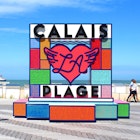
Apr 21, 2024 • 9 min read

Apr 19, 2024 • 8 min read

Apr 17, 2024 • 6 min read
Flights to France from $100*
*Modifying this information may result in a different fare
Find your flight to France

New York (JFK) to
Los Angeles (LAX) to
Miami (MIA) to
Phoenix (PHX) to
*Fares displayed have been collected within the last 48hrs and may no longer be available at time of booking. Additional fees and charges for optional products and services may apply.
Check our flights to France for the upcoming months

Travel to France
Whether you're looking for a last-minute flight to France or planning a flight at a later date, take advantage of our lowest prices for your travel dates on this site. With our flights list you can easily find the cheapest prices for the coming months to fly with Air France to France departing from United States airports. You can also directly pick your departure date on our booking engine at the top of the page, if your trip to France (Europe) is already scheduled.
Prepare your stay in France (Europe) by visiting our latest updates related to Covid-19
Flights to France from the USA
France is a country of around 67 million people with the sixth largest economy in the world (currency, the Euro) and a surface area that is almost as big as Texas. It has been a major political player on the European scene since the 6th century AD, a tradition that has continued into modern times. Its generally temperate climate is particularly pleasant during the summertime, with hotter weather a feature of the country’s Mediterranean region. France is in the Central European Time Zone, one hour head of GMT, six hours ahead of New York, 7 ahead of Chicago and 9 ahead of L.A.
France is famous for its contribution to the arts, from film and painting to literature and sculpture, and many of the world’s most iconic art galleries are to be found here.
There are flights to France from many major US cities, with Air France linking Atlanta, Chicago, Detroit, Houston, New York, Miami, Los Angeles, San Francisco and Washington DC directly to Paris Charles de Gaulle airport . Paris is of course famous as one of the planet’s most romantic destinations, with its beautiful architecture, lovely green spaces and sophisticated café culture vibe.
France is actually the world’s most visited country, and the French capital contains many of France’s top attractions. The Louvre art gallery takes the prize for both the biggest gallery in the world by size and the most visited such attraction, with tourists drawn to Leonardo’s ‘Mona Lisa’ and the Venus de Milo. The Palace of Versailles , last home of France’s monarchy, the Eiffel Tower and the Sacré Coeur basilica are other visitor favorites.
France – so much more than just Paris!
Many visitors stay firmly within the Ile de France – the region containing Paris and its surrounding area. That’s a shame, because the rest of the country has so much to offer.
Air France’s extensive domestic network will take you to every corner of this beautiful country, from the wild Atlantic coast to the banks of the Rhine River and the lavender fields of Provence. A nature-lover’s dream, stand-out locations include the Camargue wetlands with their flamingos and white horses; the Gorges du Verdon (sometimes called Europe’s Grand Canyon) and the French Alps (including western Europe’s highest peak, the Mont Blanc).
The French landscape has also been heavily shaped by humankind and agriculture is still a major industry here, the most famous products of which hail from the vineyards of Champagne, Bordeaux, Burgundy and Cognac. A tour and wine-tasting session at a local winery is definitely a vacation highlight for many visitors.
Others, when they think of France, will visualize the superb built heritage, which finds its epitome in medieval and Renaissance castles – the famous ‘châteaux’ - and cathedrals. One of France’s most popular – and instantly recognizable – sights is the Mont St-Michel , which in some ways is a combination of both castle and cathedral. This fortified abbey on a tidal island is connected to the mainland by a causeway. Although France boasts thousands of castles, the most famous by far are those situated in the Loire Valley. Their stunning architectural designs and exquisitely landscaped grounds were some of the finest creations of Renaissance Europe and they find their supreme expression in castles like Chambord, Chenonceau and Azay-le-Rideau. In contrast, France’s most beautiful churches, its Gothic cathedrals , are concentrated further north. The majestic cathedrals of Amiens, Chartres, Reims, Strasbourg are some of France’s greatest gifts to the world.
If you need a little more inspiration, the Air France website can even help you plan your vacation activities !
Add a little ‘je ne sais quoi’ to your French vacation with these handy websites!
Top websites to help you get the most from your French vacation!
- us.france.fr/en
- en.parisinfo.com/
- Visiting Paris and its surrounding areas
- louvre.fr/en
- Tourism in Camargue
- Tourist office of Mont Saint Michel
- Tourism in Normandy
More flight offers to France
- New York - France
- Los Angeles - France
- Miami - France
- Phoenix - France
- Boston - France
- Houston - France
- San Francisco - France
- Washington, D.C. - France
- Chicago - France
- Atlanta - France
- Dallas - France
- Denver - France
- Raleigh - France
- Seattle - France
- Orlando - France
- Detroit - France
- Minneapolis - France
- San Diego - France
- Tampa - France
- Las Vegas - France
- Cincinnati - France
- Fort Lauderdale - France
- Austin - France
- Philadelphia - France
- Charleston, SC - France
- Baltimore - France
- Nashville - France
Security Alert May 17, 2024
Worldwide caution, update may 10, 2024, information for u.s. citizens in the middle east.
- Travel Advisories |
- Contact Us |
- MyTravelGov |
Find U.S. Embassies & Consulates
Travel.state.gov, congressional liaison, special issuance agency, u.s. passports, international travel, intercountry adoption, international parental child abduction, records and authentications, popular links, travel advisories, mytravelgov, stay connected, legal resources, legal information, info for u.s. law enforcement, replace or certify documents, before you go.
Learn About Your Destination
While Abroad
Emergencies.
The highest priority of the Bureau of Consular Affairs is to protect the lives and serve the interests of U.S. citizens abroad. Across the globe, we serve our fellow citizens during some of their most important moments – births, adoptions, medical emergencies, deaths, arrests, and disasters.
Country Information
Crisis and disasters, other federal agencies, different types of travelers.
Cruise Ship Passengers
Faith-Based Travelers
High-Risk Area Travelers
LGBTQI+ Travelers
Older Travelers
Travel Safety - Race and Ethnicity
Enroll in STEP

Subscribe to get up-to-date safety and security information and help us reach you in an emergency abroad.
Recommended Web Browsers: Microsoft Edge or Google Chrome.
Learn about your destination
Make two copies of all of your travel documents in case of emergency, and leave one with a trusted friend or relative.
External Link
You are about to leave travel.state.gov for an external website that is not maintained by the U.S. Department of State.
Links to external websites are provided as a convenience and should not be construed as an endorsement by the U.S. Department of State of the views or products contained therein. If you wish to remain on travel.state.gov, click the "cancel" message.
You are about to visit:
- Go to the main menu
- Go to the mobile menu
- Go to main content
- Press Room Press Room

- Increase text size
- Decrease text size
- Add our RSS feed
Reopening France’s borders from 9 June (4 Jun. 2021)
- Share on Twitter
- Share on Facebook
- Partager sur Linkedin
Travel flows between France and foreign countries will re-open from 9 June according to terms contingent upon the health situation of these countries and the traveller’s vaccination status.

easyJet launches new routes from UK airports to holiday hotspots in France, Morocco and more
Budget airline easyJet has expanded routes with flights set to operate from the UK to Greece, France, Morocco and more.
New routes will travel from London, Glasgow, Bristol and other airports across the country.
More than 1,000 new short-haul routes will be available with the airline going from airports across the UK.
Many of the new routes will commence at the end of this year, giving Britons the chance to enjoy some winter sun.
easyJet new routes
London Luton - from November 2024
Athens - three times a week
Basel - four times a week
Djerba - twice a week
Lanzarote - twice a week
Fuerteventura
Edinburgh - from November 2024
Agadir - twice a week
Belfast International - from November 2024
Prague - twice a week
Marrakech - twice a week
Krakow - twice a week
Reykjavik - twice a week
Innsbruck - once a week
Leed - January 2025
Newcastle - October 2024
LATEST DEVELOPMENTS
・ Holidaymakers describe 'chaos' as airports make U-turn on decision to scrap 100ml liquid rule
・ 'Spend your money where it's appreciated!' Britons 'cancel holidays' to Spain amid protests
・ 'It's just weird!' Expat in Greece warns of 'biggest culture shock' in the country
Other routes will go from London Gatwick, Bristol, and Manchester to Tromso in Norway and travellers from London Gatwick will be able to go to Strasbourg on flights three times a week.
easyJet’s UK country manager Ali Gayward said: “We’re delighted to be releasing an incredible range of new routes today for this winter, with 33 new services now available from airports across the UK.
"Our flights and holidays are available for even more and brand new destinations, including Tromso in Norway and the French city of Strasbourg, further strengthening our unrivalled short-haul European network and providing customers with even more fantastic choice and great value.”
This comes as Virgin launches new UK flights including daily service to city with "hidden gems" .

- Cover Letters
- Jobs I've Applied To
- Saved Searches
- Subscriptions
Marine Corps
Coast guard.
- Space Force
- Military Podcasts
- Benefits Home
- Military Pay and Money
- Veteran Health Care
- VA eBenefits
- Veteran Job Search
- Military Skills Translator
- Upload Your Resume
- Veteran Employment Project
- Vet Friendly Employers
- Career Advice
- Military Life Home
- Military Trivia Game
- Veterans Day
- Spouse & Family
- Military History
- Discounts Home
- Featured Discounts
- Veterans Day Restaurant Discounts
- Electronics
- Join the Military Home
- Contact a Recruiter
- Military Fitness
Russian Flotilla Off Florida Coast Sparks Deployment of US Navy Destroyers, Planes

The Pentagon deployed three Navy destroyers and maritime patrol aircraft this week to keep tabs on a group of Russian ships that conducted missile exercises and reportedly got within 30 miles of the Florida coast.
"In accordance with standard procedure, we've been actively monitoring the Russian ships as they transit the Atlantic Ocean within international waters," a defense official, who spoke on the condition his name not be used, told Military.com in an emailed statement Wednesday.
The official added that "air and maritime assets under U.S. Northern Command have conducted operations to ensure the defense of the United States and Canada," but wouldn't elaborate on what those assets were. Pentagon spokeswoman Sabrina Singh also wasn't able to offer specifics at a briefing to reporters Wednesday.
Read Next: Lasting Grief but Few Answers: Families of Troops Killed in Osprey Crashes React to Hearing on Troubled Aircraft
In contrast, Russia has been very clear about what ships were deployed and what they were up to.
Russian state-run media announced last week that a group of four ships, including a frigate and a nuclear-powered submarine, would be making a port call in Havana between June 12 and June 17.
On Tuesday, the Russian Ministry of Defense said in an online post that the ships conducted exercises in the use of "high-precision missile weapons in the Atlantic Ocean" and included video shot aboard the vessels.
"As part of the exercise, the crews of a frigate and a nuclear-powered submarine practiced the use of high-precision missile weapons using computer-simulated naval targets that represent naval groups of a mock enemy and are located at a distance of over 600 kilometers," the statement said, while noting no missiles were launched.
The Pentagon would not say what U.S. assets were deployed in response to the Russian presence, but online amateur analysts used public flight and ship-tracking data to identify the three destroyers as the USS Truxtun, USS Donald Cook and USS Delbert D. Black on Tuesday.
They also identified U.S. Navy P-8 Poseidon maritime patrol and anti-submarine aircraft as part of the response.
The defense official who spoke with Military.com on Wednesday would go only so far as to say that the Navy's U.S. 2nd Fleet, U.S. 4th Fleet, U.S. Coast Guard Atlantic Area and Canadian Joint Task Force Atlantic were all "conducting routine operations throughout the Atlantic, and we will continue to operate and engage from a position of strength."
A Defense Department photo of the Truxtun taken last week noted that the destroyer was sailing with the Canadian frigate HMCS Ville de Québec and U.S. Coast Guard Cutter Stone -- two ships that online analysts also suspected to be responding to the Russians.
Online analysts also estimated that the Russian flotilla got within 25 miles of shore. The Miami Herald, citing unnamed U.S. officials, reported that the ships sailed "less than 30 miles off South Florida's coast" on Tuesday.
According to images uploaded to sites such as Telegram by Russian state-run outlets, the Russian ships , including the frigate and the submarine, pulled into Havana on Wednesday.
Singh, the Pentagon spokeswoman, downplayed the presence of the flotilla by telling reporters that "we've seen them do this -- these type of port calls before -- and these are routine naval visits that we've seen under different administrations."
"We're always constantly going to monitor any foreign vessels operating near U.S. territorial waters ... but these exercises don't pose a threat to the United States," she added.
However, unlike prior port visits that involved less-advanced Russian vessels, the submarine and the frigate are some of the newest and most advanced Russian warships currently in that country's arsenal.
The frigate, the "Admiral Gorshkov," was commissioned in 2018.
Meanwhile, the submarine, the "Kazan," was commissioned in 2021 and is similar to U.S. guided-missile nuclear submarines, capable of carrying a range of anti-ship and land attack missiles, including the hypersonic "Zircon" anti-ship missile, according to an analysis by the U.K.-based think tank Royal United Services Institute , or RUSI.
RUSI's report noted that the Kazan has " a reported level of quietness comparable to the very best Western [nuclear submarines] and a long-range strike capability which exceeds that seen on most Western assets."
USNI News reported in 2014 that a U.S. Navy official in charge of its submarine program was so impressed with that class of Russian submarine that he had a model of the lead boat -- the Severodvinsk -- placed outside his office so that he could look at it daily.
The defense official who spoke with Military.com said that, while Russian naval visits to Cuba are routine, they have "ratcheted up because of U.S. support to Ukraine and exercise activity in support of our NATO allies."
"We should expect more of this activity going forward," the official added.
Related: Navy Relieved 12 Commanders in 6 Months -- Including 3 Firings that Were Never Publicly Announced
Konstantin Toropin

You May Also Like

The jury selection process is raising alarm for Maj. Gen. Phillip Stewart's defense team, especially given that only six of...
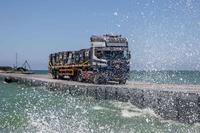
A pair of bills advanced last week in the House seeks to end the mission that was billed as the Biden administration's...

American officials say foreign countries like China and Iran intimidate, harass and sometimes plot attacks against political...

NATO members agreed last year to spend at least 2% of their gross domestic product on defense.
Military News
- Investigations and Features
- Military Opinion
Select Service
- National Guard
Most Popular Military News

The Russian Ministry of Defense said in an online post that the ships conducted exercises in the use of "high-precision...

A decade of declining recruitment numbers for the Army is almost entirely attributable to a significant drop in male...

The service announced Friday that it relieved Cmdr. David Ruhlig on June 3 "due to a loss of confidence in his ability to...

For the second year in a row, the House approved its version of the National Defense Authorization Act, or NDAA, mostly along...

The U.S. military launched the disinformation campaign following a decision by then-Defense Secretary Mark Esper to loosen...
Latest Benefits Info
- Servicemembers' Group Life Insurance (SGLI): What You Need to Know
- 8 Keys to Understanding VA Loan Occupancy Rules
- Paying for School with Federal Aid
- The GI Bill Yellow Ribbon Program Explained
- VA Health Care Eligibility
More Military Headlines

Lt. Col. Ryan Vazquez also testified that there were limitations on forcing the gunman, reservist Robert Card, to adhere to a...

Several hundred LGBTQ Ukrainian servicemen and their supporters marched in central Kyiv to demand more rights and highlight...
- Lawmakers Move to Defund US Military's Gaza Aid Pier After Torrent of Problems
- Army Lieutenant Colonel Says Lewiston Shooter Had 'Low Threat' Profile upon Leaving Hospital
- 'A Betrayal': How a Decorated Army Officer Fell from Grace in a University ROTC Sex Scandal
- Jury Selection for 2-Star Air Force General's Sexual Assault Court-Martial Set to Begin Tuesday
- State Air Guard Units Could Be Moved to Space Force Despite Governors' Opposition Under Senate Proposal
- Lasting Grief but Few Answers: Families of Troops Killed in Osprey Crashes React to Hearing on Troubled Aircraft
- A Year After the Titan's Tragic Dive, Deep-Sea Explorers Vow to Pursue Ocean's Mysteries
- US Aircraft Carrier Counters False Houthi Claims with 'Taco Tuesdays' as Deployment Stretches On
- US Military Targets Houthi Radar Sites in Yemen After a Merchant Sailor Goes Missing
Military Benefits Updates
- The Next Deadline for Backdated PACT Act Payments Is Coming Soon. Here’s What You Need to Know
- VA Fertility Benefits for Military Veterans
- Virginia Veterans Rally the Troops, State Leaders in Support of Education Benefits
- Massive Search at Hawaii Marine Corps Training Ground Fails to Find Alleged Poachers Carrying Gun, Knife
- Marine Corps Museum Opens 'Respite Room' as New Way to Help Visitors Deal with PTSD
- Coast Guard Relieves Commander of Biggest Station for Failing to Act on Harassment Claims
- From the Coast Guard to NASA: How Andre Douglas Became a Rarity Among Astronauts
Entertainment
- Watch 'Band of Brothers' Cast Members Jump into Normandy for D-Day's 80th Anniversary
- ‘World of Tanks’ Wants You to Invade Normandy During D-Day
- Idris Elba Explores the Lost Stories of World War II Service Members of Color in Nat Geo's 'Erased'

IMAGES
COMMENTS
When in France, please carry a photocopy of your passport separately from your passport. The copy will facilitate issuance of a replacement ($75 fee for adults, $85 for children). The American Embassy in Paris is at 2, avenue Gabriel, tel. 01 43 12 22 22. The Passport Section is nearby at 4, avenue Gabriel (open 9a.m.-noon, Monday- Friday).
Call us in Washington, D.C. at 1-888-407-4747 (toll-free in the United States and Canada) or 1-202-501-4444 (from all other countries) from 8:00 a.m. to 8:00 p.m., Eastern Standard Time, Monday through Friday (except U.S. federal holidays). See the State Department's travel website for the Worldwide Caution and Travel Advisories.
For this reason, we recommend that your passport have at least six months' validity remaining whenever you travel abroad. When traveling to France, please note that the Government of France does NOT recognize the 12-page U.S. emergency passport, issued by U.S. embassies and consulates overseas, as a valid travel document for visa-free travel ...
Your Covid-19 questions answered. French people who are living abroad, travelling or returning from abroad, as well as visitors from abroad, will find answers below to frequently asked questions on COVID-19 measures. This FAQ supplements the information on the Conseils aux voyageurs (Travel advice, in French only) section.
Yes, U.S. citizens can currently travel to France. On June 18, the same day that the European Council added the United States to its list of countries approved for entry, France moved the United States to its " green list " of countries. This means all U.S. travelers can enter, regardless of vaccination status (though the requirements are ...
Find continuously updated travel restrictions for France such as border, vaccination, COVID-19 testing, and quarantine requirements.
The rules for travel to France depend on the country from which you will travel, the reason for which you are travelling and your vaccination status. As of March 12th, 2022 the United States is listed as "green country". Last update: September 15th, 2022.
This site is developed by Atout France, the national tourism operator under the supervision of the Ministry of Europe and Foreign Affairs. (Update: July 2023) With more than 90 million foreign visitors recorded in 2018 (including overseas destinations), France remains the world's leading tourist (…)
As of August 1, there are no Covid-19 related travel restrictions for France. This means travelers are no longer required to present proof of vaccination, complete a sworn statement before arrival ...
an international travel declaration; a sworn statement certifying that the traveller shows no symptoms of being infected with COVID-19. France is also continuing its efforts to increase coordination with its European partners, in particular its border countries.
The health pass is required in the following circumstances: When entering health care centers, if you come to visit a relative or if you have a scheduled procedure. When crossing a border during a trip from/to France. In some overseas French territories where the use of the health or vaccine pass has been extended.
COVID-19 : International travel. Mobilising on a weekly basis up to 6,000 members of the civil security service to carry out tests, border guards to check travellers' health documents and internal security forces to oversee the isolation or quarantine measures decreed by the prefects, this mechanism was duly adjusted in response to the ...
U.S. citizens traveling to a country outside the U.S. Find country-specific travel advisories, including COVID-19 restrictions, from the Department of State. See the CDC's COVID-19 guidance for safer international travel to learn: If you can travel if you recently had COVID-19. What you can do to help prevent COVID-19. LAST UPDATED: May 31, 2024.
As of June 9, 2021, France has reopened its borders to international travelers. Those coming from the U.S. must possess proof of vaccination to the country without mandatory quarantine. As of Sept. 10, unvaccinated U.S. travelers are no longer allowed to enter with proof of a negative COVID-19 test.
France. The 2024 Summer Olympics will take place in Paris, France, from July 26-August 11, 2024. The Paralympic Games is scheduled for August 28-September 8, 2024. Crowds are expected at these events, and mass gatherings are associated with unique health risks. If you plan to travel to Paris for these events, visit a travel health specialist at ...
1. Pay attention to tourist laws in France. EU residents can come and go as they please, but non-EU nationals (including those holding British and American passports) have the right to stay in France for up to 90 days within the period of 180 days, visa free (your passport is stamped upon arrival and exit).
For more details about travelling in France, go to the UK Foreign Office travel advice. Return to UK Everyone aged 12 and over travelling to the UK must fill in an online passenger locator form ...
Use public transportation. France has an efficient and affordable network of metros, buses, and trains that can take you where you need to go. Stay in budget-friendly accommodations. You can save money by staying outside city centers or by using Skyscanner to compare rates from top hotels. Eat like a local.
Tourists, exchange students, and people visiting for business from certain countries, like the United States, can travel in the Schengen area for up to 90 days. The Schengen area includes most EU countries, except for Cyprus and Ireland. It also includes four non-EU countries: Iceland, Norway, Switzerland, and Liechtenstein.
If your pet is traveling through (transiting) a country in the European Union (EU) on the way to a third, non-EU country, you will also need a transit health certificate for your pet for the EU. The transit health certificate will be the same as if your pet's final destination was the EU country. Use the information and steps above under ...
Identification for travel. U.S. law requires all customers, regardless of citizenship, age, or destination, to hold a secure document to leave the United States by air. For all travel within the United States, you'll need U.S. federal or state-issued photo ID that contains your name, date of birth, gender, expiration date and a tamper ...
Following the measures announced by the government on 29 January 2021: Travellers to or from a destination outside the European space. As of Sunday, 31 January 2021, all travel to France or from France to any country outside the European space (European Union Member States, Andorra, the Holy See, Iceland, Liechtenstein, Monaco, Norway, San Marino and Switzerland) will be denied, with the ...
Flights to France from the USA. France is a country of around 67 million people with the sixth largest economy in the world (currency, the Euro) and a surface area that is almost as big as Texas. It has been a major political player on the European scene since the 6th century AD, a tradition that has continued into modern times. Its generally temperate climate is particularly pleasant during ...
Travel.State.Gov > International Travel The highest priority of the Bureau of Consular Affairs is to protect the lives and serve the interests of U.S. citizens abroad. Across the globe, we serve our fellow citizens during some of their most important moments - births, adoptions, medical emergencies, deaths, arrests, and disasters.
Receive up to 40% off available accommodation bookings in the US including AK, HI, Puerto Rico, and US Virgin Islands and bookings for international travel. Discount is applied to price of room before taxes and any fees, including additional fees collected by the property at check-in. Reservations can only be made up to eleven months in advance ...
Pet Travel. Take a Pet From the United States to Another Country (Export) Bring a Pet From Another Country into the United States (Import) Take a Pet From One U.S. State or Territory to Another (Interstate) USDA-Accredited Veterinarians: Certifying Pets for International Travel; Traveling With Food or Agricultural Products
Reopening France's borders from 9 June (4 Jun. 2021) Travel flows between France and foreign countries will re-open from 9 June according to terms contingent upon the health situation of these countries and the traveller's vaccination status. Strategy for reopening the borders from 9 June - (PDF, 1 Mb)
Budget airline easyJet has expanded routes with flights set to operate from the UK to Greece, France, Morocco and more. New routes will travel from London, Glasgow, Bristol and other airports ...
The official added that "air and maritime assets under U.S. Northern Command have conducted operations to ensure the defense of the United States and Canada," but wouldn't elaborate on what those ...